Search Result
Results for "
LNCaP
" in MedChemExpress (MCE) Product Catalog:
3
Isotope-Labeled Compounds
| Cat. No. |
Product Name |
Target |
Research Areas |
Chemical Structure |
-
- HY-70002
-
Enzalutamide
Maximum Cited Publications
135 Publications Verification
MDV3100
|
Androgen Receptor
Autophagy
|
Cancer
|
|
Enzalutamide (MDV3100) is an androgen receptor (AR) antagonist with an IC50 of 36 nM in LNCaP prostate cells. Enzalutamide is an autophagy activator .
|
-
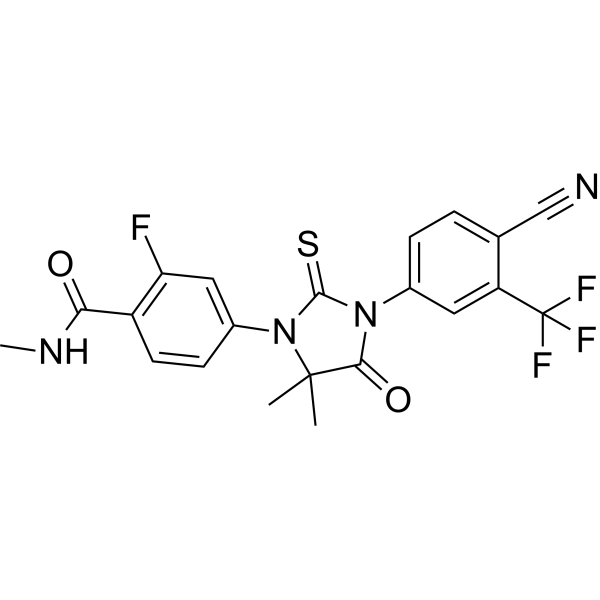
-
- HY-70002S1
-
|
MDV3100-d6
|
Androgen Receptor
|
Cancer
|
|
Enzalutamide-d6 is a deuterium labeled Enzalutamide (MDV3100). Enzalutamide is an androgen receptor (AR) antagonist with an IC50 of 36 nM in LNCaP prostate cells[1].
|
-
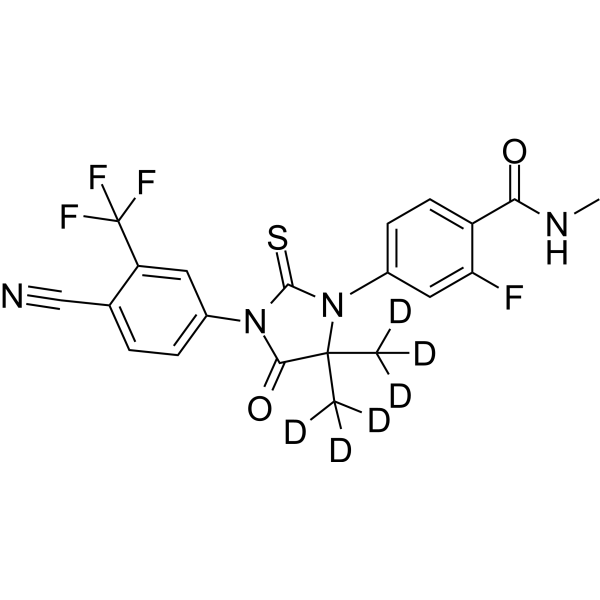
-
- HY-146494
-
|
|
Androgen Receptor
|
Cancer
|
|
Androgen receptor antagonist 5 (compound 42f) is a potent androgen receptor (AR) antagonist with an IC50 value of 6.17 μM. Androgen receptor antagonist 5 can effectively impair AR nuclear translocation, reducing the levels of nuclear AR, and disrupts AR-mediated gene regulation. Androgen receptor antagonist 5 has antiproliferative activity against LNCaP and exhibits antitumor activity in LNCaP xenograft tumor mice model. Androgen receptor antagonist 5 can be used for researching prostate cancer .
|
-
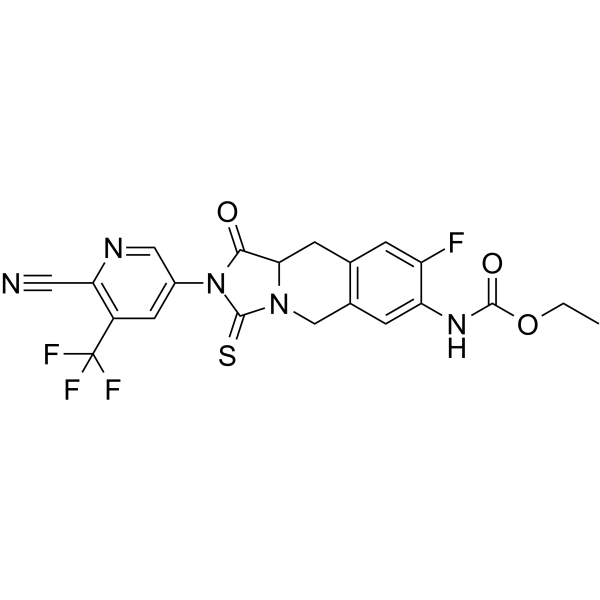
-
- HY-N10265
-
|
|
Endogenous Metabolite
|
Cancer
|
|
Stephacidin B is a fungal metabolite. Stephacidin B shows in vitro cytotoxicity against a panel of human tumor cell lines. Stephacidin B shows the strongest cytotoxicity against testosterone-dependent prostate LNCaP cancer cells .
|
-
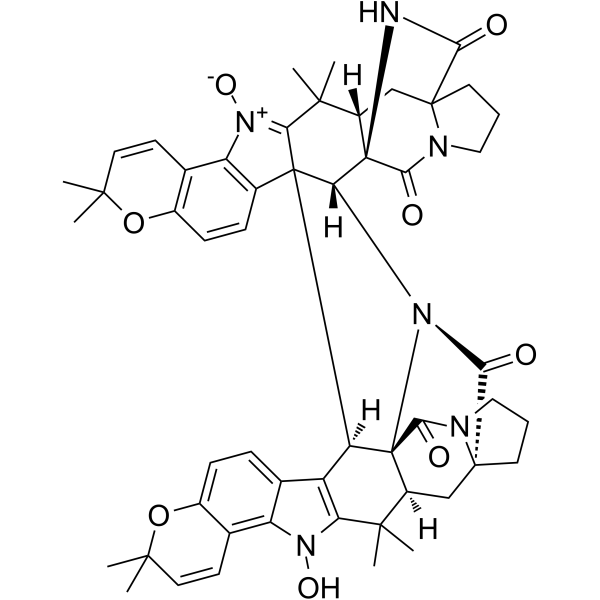
-
- HY-150268
-
|
|
Epigenetic Reader Domain
|
Cancer
|
|
BET-IN-16 (Comp I) is a BET inhibitor. BET-IN-16 shows anticancer activity. BET-IN-16 inhibits prostate cancer cell growth, with IC50 values of 0.043 and 0.034 μM against LNCaP and 22Rv1 cells, respectively .
|
-
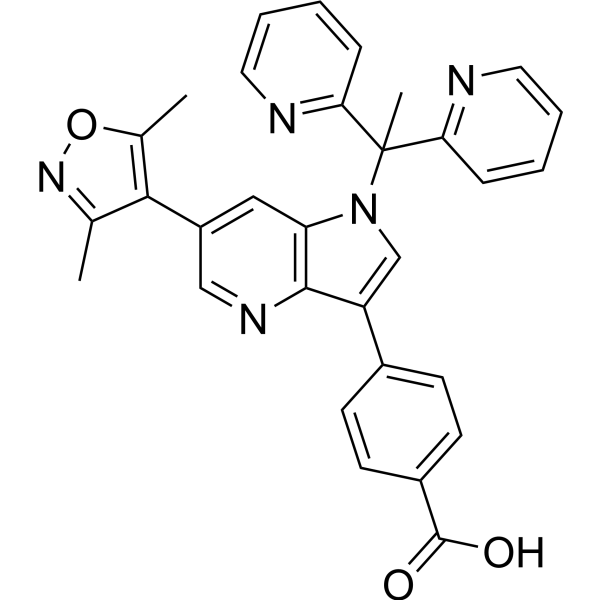
-
- HY-149433
-
|
|
Androgen Receptor
Apoptosis
|
Cancer
|
|
BWA-522 is an orally available small molecule protein-targeting chimera (PROTACs) with significant degradation effect on AR-FL and AR-V7. BWA-522 antagonizes the N-terminal domain (AR-NTD) of the androgen receptor (Androgen Receptor) and induces apoptosis in PC cells. BWA-522 inhibits tumor growth in LNCaP xenograft model studies (60 mg/kg, po; TGI=76%). The efficiencies of BWA-522 in degrading AR-V7 and AR-FL were 77.3% (1 μM) and 72.0% (5 μM) in VCaP and LNCaP cells, respectively .
|
-
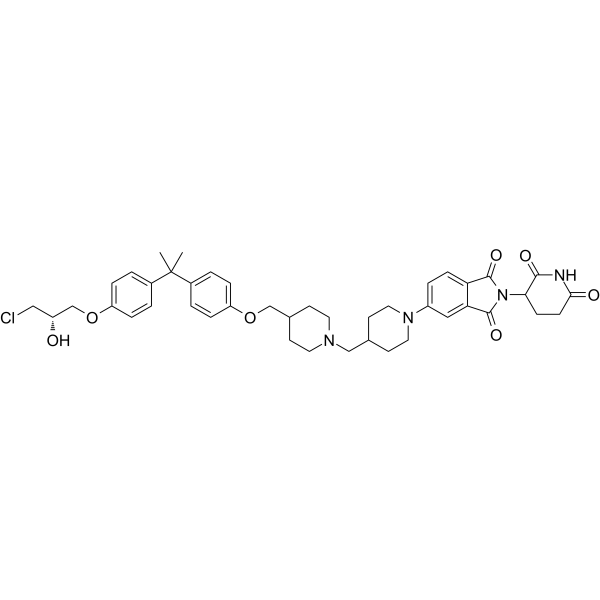
-
- HY-153772
-
|
|
Androgen Receptor
|
Cancer
|
|
Androgen receptor antagonist 8 (Example 13) is an androgen receptor antagonist. Androgen receptor antagonist 8 inhibits prostate specific antigen secretion in LNcap cell (IC50: 88 nM). Androgen receptor antagonist 8 can be used for prostate cancer research .
|
-
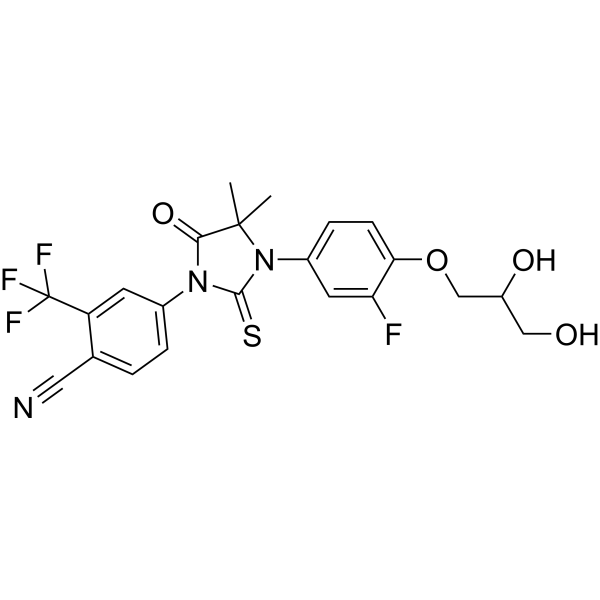
-
- HY-149914
-
|
|
Androgen Receptor
|
Cancer
|
|
WCA-814 is an androgen receptor (AR) antagonist-Hsp90 inhibitor conjugate. WCA-814 induces the degradation of full-length and AR-V7. WCA-814 has cytotoxic effect in prostatic cancer cells (IC50: 171.2 nM, 26.5 nM for LNCaP, 22Rv1 cell) .
|
-
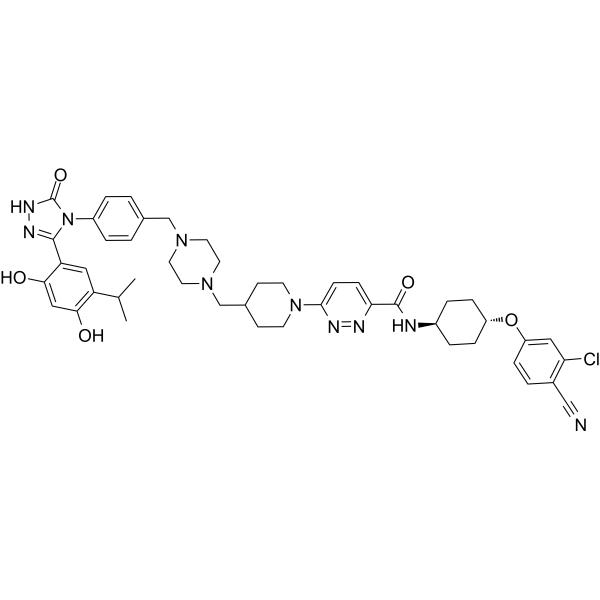
-
- HY-N2733
-
|
|
Others
|
Others
|
|
7,2',4'-Trihydroxy-5-methoxy-3-arylcoumarin is a coumarin, that can be isolated from campylotropis hirtella (FRANCH.) SCHINDL. 7,2',4'-Trihydroxy-5-methoxy-3-arylcoumarin inhibits PSA secretion in LNCaP cells, with an IC50 of 24.2 μg/mL .
|
-
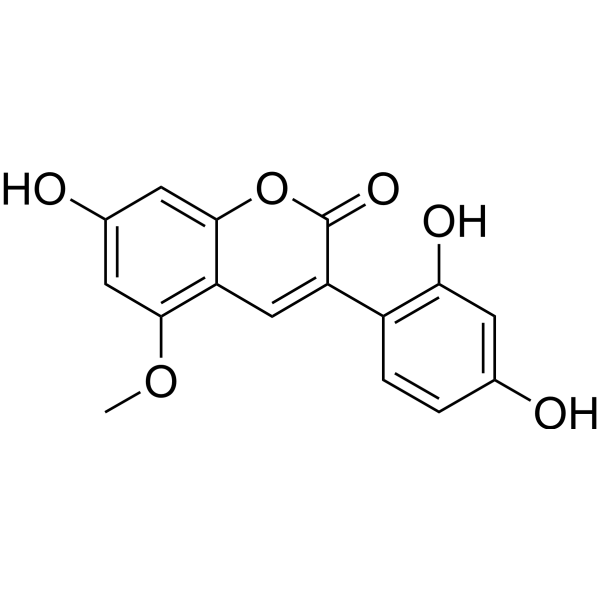
-
- HY-147935
-
|
|
Akt
|
Cancer
|
|
NTQ1062 is a potent and orally active Akt inhibitor with IC50s of 0.4 nM, 6.3 nM and 0.1 nM for Akt1, Akt2 and Akt3, respectively. NTQ1062 induces cell apoptosis and arrests the cell cycle at G0/G1 phase. NTQ1062 exhibits antiproliferation activity against various cancer cells. NTQ1062 exhibits potent antitumor efficacy in LNCap xenograft mouse model .
|
-
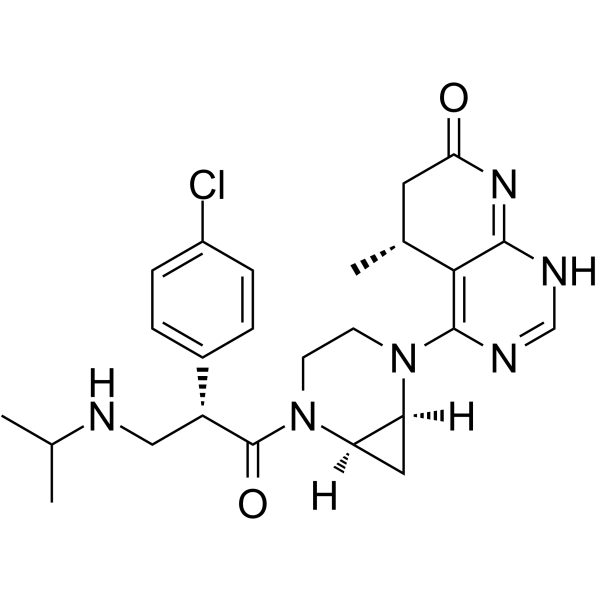
-
- HY-156003
-
|
|
HDAC
|
Cancer
|
|
HDAC-IN-64 (Compound 13) is a HDAC inhibitor. HDAC-IN-64 inhibits HDAC4/5/6/7/9 with IC50s of 24, 45, 85, 31, 37 nM. HDAC-IN-64 has anti-proliferative activity and anti-migration properties on prostate cancer (PCA) cells. HDAC-IN-64 inhibits LNCaP and RWPE-1 cell growth with GI50 of 0.32 and 1.1 μM respectively .
|
-
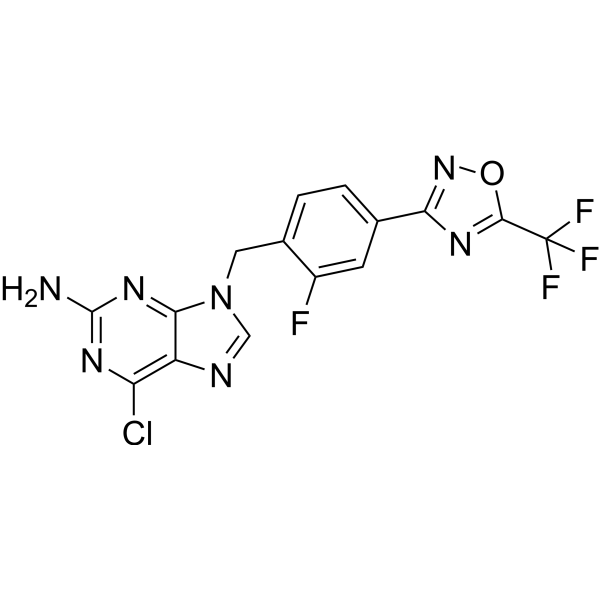
-
- HY-115282A
-
|
TRC-253
|
Androgen Receptor
|
Cancer
|
|
JNJ-63576253 (TRC-253) is a potent and orally active full antagonist of androgen receptor (AR), with IC50s of 37 and 54 nM for F877L mutant AR and wild-type AR in LNCaP cells. JNJ-63576253 can be used for the research of castration-resistant prostate cancer (CRPC) .
|
-
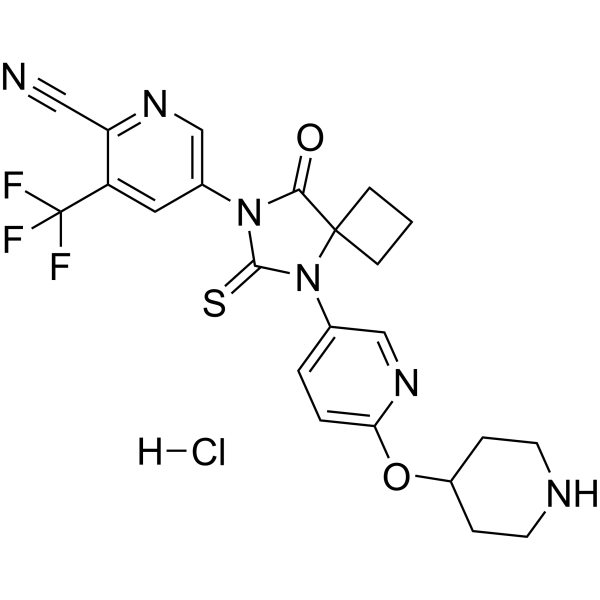
-
- HY-149862
-
|
|
PROTACs
Androgen Receptor
|
Cancer
|
|
ARD-2051 is a potent and orally active androgen receptor (AR) proteolysis-targeting chimera degrader. ARD-2051 achieves DC50 values of 0.6 nM for AR protein degradation in both the LNCaP and VCaP prostate cancer cell lines. ARD-2051 can be used for the research of prostate cancer .
|
-
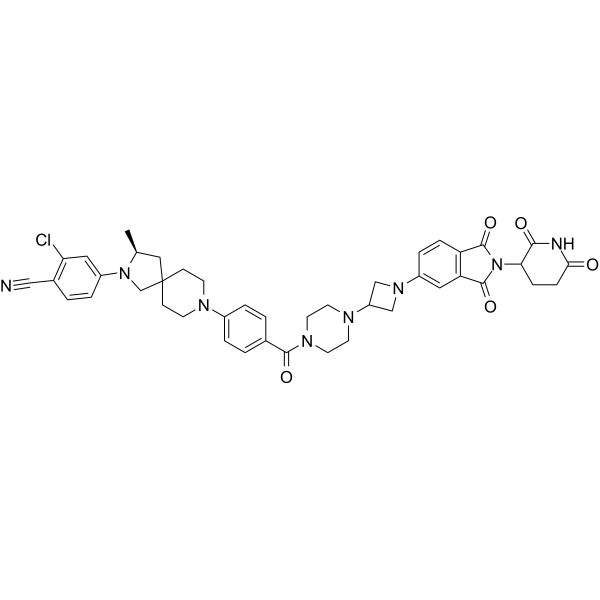
-
- HY-139344
-
|
|
FAK
PROTACs
|
Cancer
|
|
FC-11 is a PROTAC FAK degrader (DC90: 1 nM) . FC-11 contains CRBN ligand Pomalidomide (HY-10984), linker and FAK ligand PF562271 (HY-10459). FC-11 degrades FAK in various cells, with DC50s of 310 pM in TM3, 80 pM in PA1, 330 pM in MDA-MB-436, 370 pM in LNCaP, and 40 pM in Ramos cells .
|
-
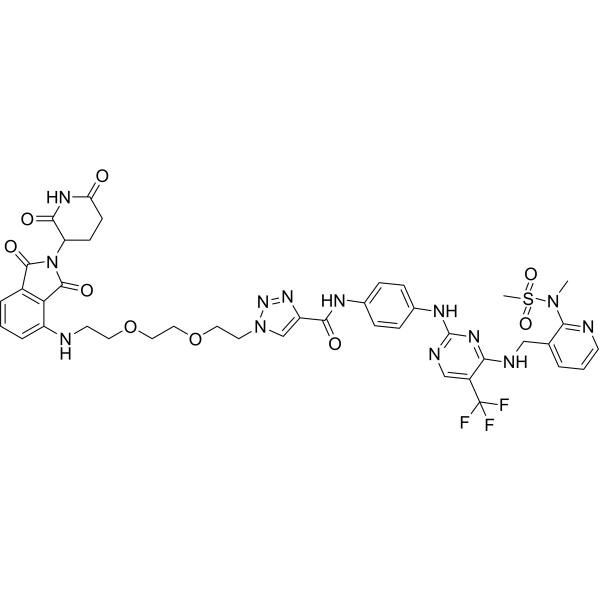
-
- HY-144755
-
|
|
Histone Demethylase
|
Cancer
|
|
MC2652 (compound 1a) is a potent LSD1 inhibitor. MC2652 displays high inhibiting effects in MV4-11 and NB4 leukaemia cells. MC2652 shows antiproliferative activity against prostate cancer LNCaP cells .
|
-
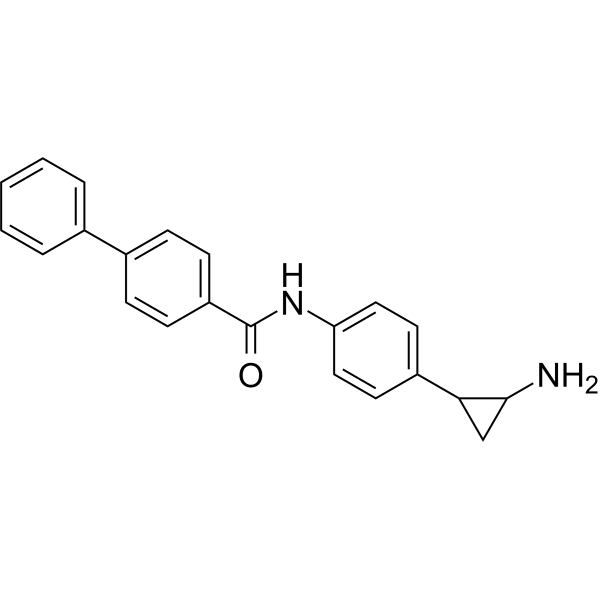
-
- HY-115282
-
|
TRC-253 free base
|
Androgen Receptor
|
Cancer
|
|
JNJ-63576253 (TRC-253) free base is a potent and orally active full antagonist of androgen receptor (AR), with IC50s of 37 and 54 nM for F877L mutant AR and wild-type AR in LNCaP cells. JNJ-63576253 free base can be used for the research of castration-resistant prostate cancer (CRPC) .
|
-
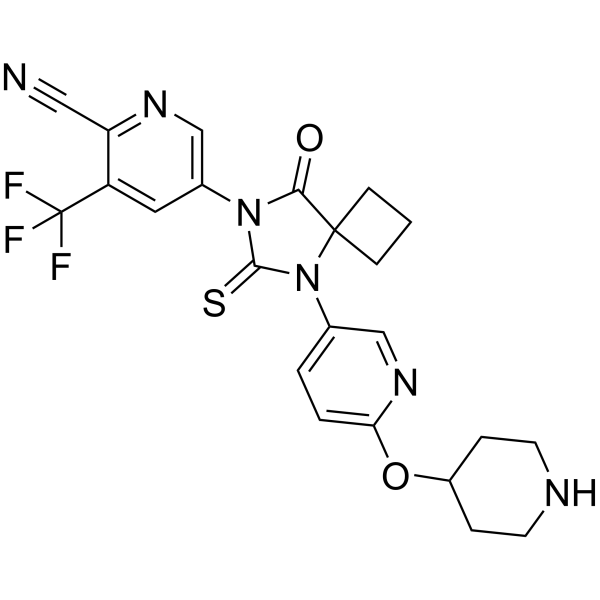
-
- HY-N3816
-
|
|
Others
|
Others
|
|
ent-17-Hydroxykaur-15-en-19-oic acid is a ent-kaurene
diterpene that can be isolated from the leaves of Laetia thamnia L..
ent-17-Hydroxykaur-15-en-19-oic acid was cytotoxic to human prostate LNCaP2
cells with IC50 17.63
mg/mL .
|
-
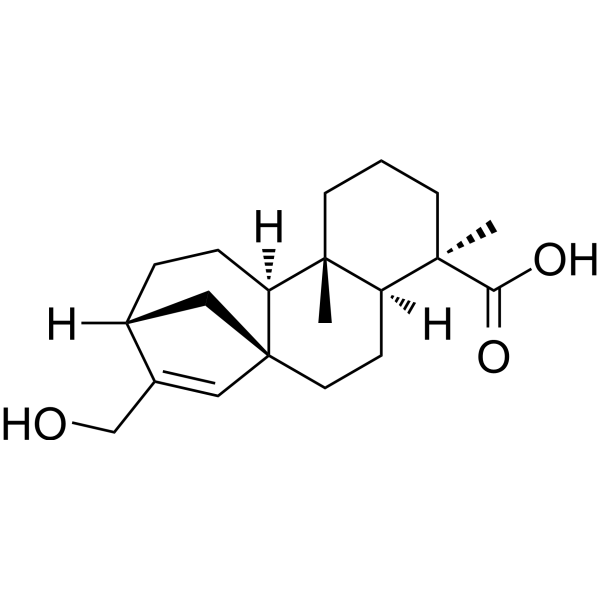
-
- HY-N2908
-
|
Methyl atrarate
|
Androgen Receptor
NO Synthase
p38 MAPK
NF-κB
|
Inflammation/Immunology
Cancer
|
|
Atraric acid (Methyl atrarate) is a specific androgen receptor (AR) antagonist with anti-inflammatory and anticancer effects. Atraric acid represses the expression of the endogenous prostate specific antigen gene in both LNCaP and C4-2 cells. Atraric acid can also inhibit the synthesis of NO and cytokine, and suppress the MAPK-NFκB signaling pathway. Atraric acid can be used to research prostate diseases and inflammatory diseases .
|
-
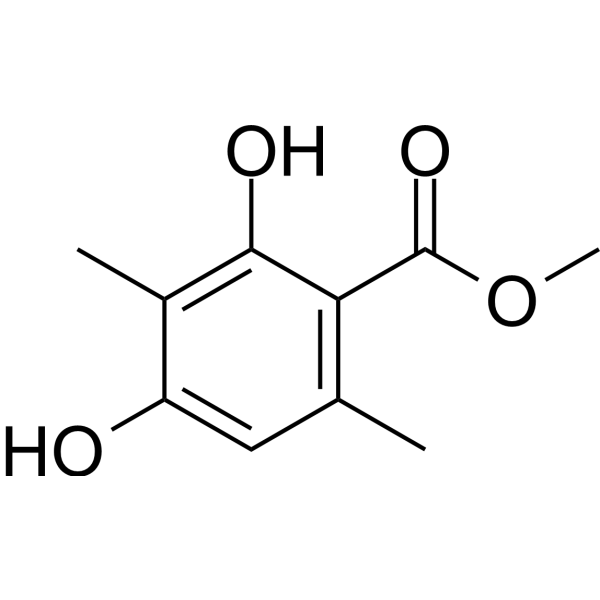
-
- HY-16079
-
AZD3514
2 Publications Verification
|
Androgen Receptor
|
Cancer
|
|
AZD3514 is an orally activie and selective androgen receptor (AR) inhibitor. AZD3514 androgen-dependently and -independently inhibits AR signal. AZD351 down-regulates nuclear AR levels in human LNCaP prostate cancer cells in the absence of androgen with an pIC50 value of 5.75. AZD3514 can be used for the research of prostate cancer .
|
-
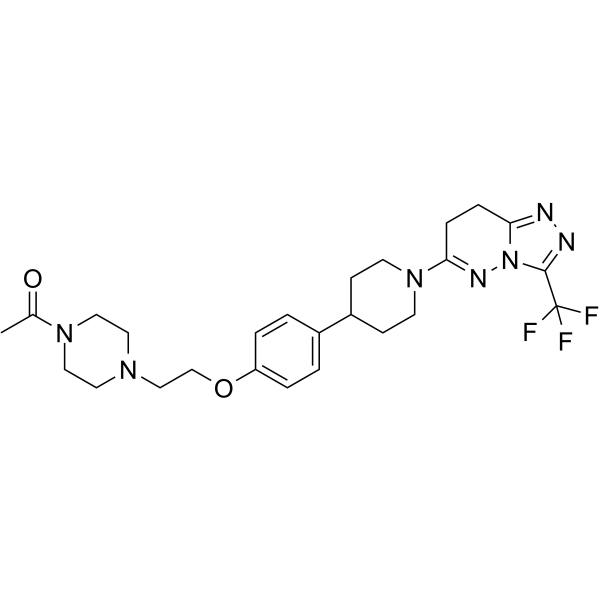
-
- HY-121619
-
|
|
Apoptosis
|
Inflammation/Immunology
Cancer
|
|
Jacaric acid is a conjugated linolenic acid, which inhibits viability in cells PC-3 (IC50 is 11.8 μM), LNCaP (IC50 is 2.2 μM) and DLD-1, induces apoptosis and necrosis . Jacaric acid exhibits anticaner activity against prostate cancer and adenocarcinoma . Jacaric acid exhibits immunomodulating activity in murine peritoneal macrophages as an immunopotentiator . Jacaric acid is orally active.
|
-
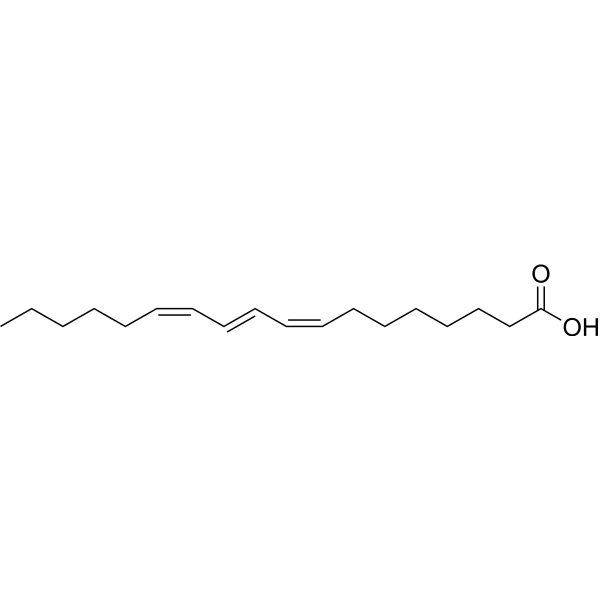
-
- HY-N1342
-
|
|
Apoptosis
|
Cancer
|
|
Rocaglaol induces apoptosis and cell cycle arrest in LNCaP cells .
|
-
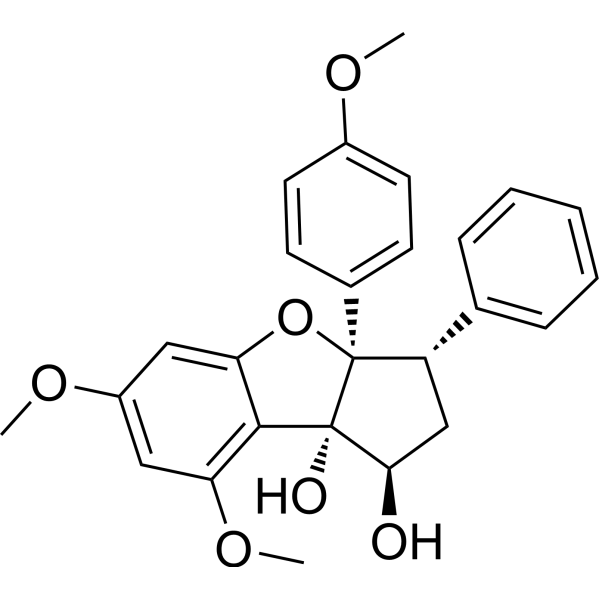
-
- HY-158113
-
|
|
Histone Acetyltransferase
PROTACs
|
Cancer
|
|
CBPD-409 is an orally active PROTAC degrader for CBP/p300, with DC50 of 0.2–0.4 nM. CBPD-409 exhibits antiproliferative effects in AR+ prostate cancer cell lines VCaP, LNCaP and 22Rv1, with IC50s of 1.2–2.0 nM. CBPD-409 exhibits antitumor efficacy (Red: CBP inhibitor GNE049 (HY-108435); Blue: CRBN/cullin 4A Thalidomide (HY-14658); Black: Linker) .
|
-
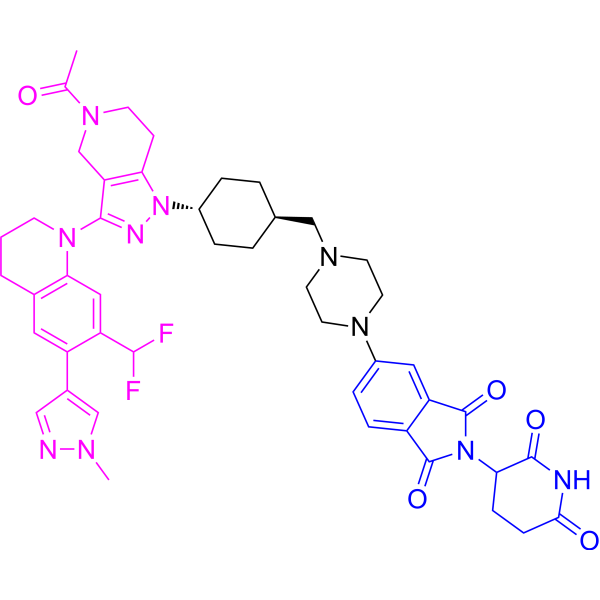
-
- HY-113332
-
-
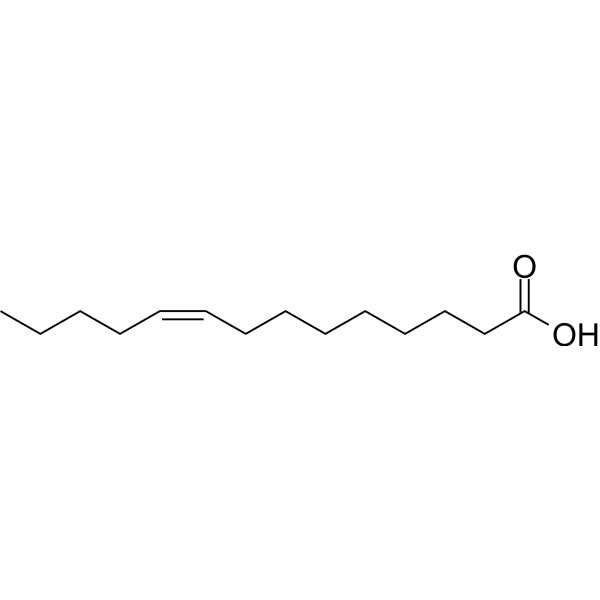
-
- HY-144756
-
|
|
Histone Demethylase
Monoamine Oxidase
|
Cancer
|
|
LSD1-IN-15 (compound 1b) is a potent LSD1 inhibitor. LSD1-IN-15 can inhibit LSD1-CoREST, MAO-A and MAO-B, with IC50 values of 0.149, 0.028, and 0.327 μM, respectively. LSD1-IN-15 displays cell growth arrest in prostate cancer LNCaP cells, with an IC50 of 9.9 μM .
|
-
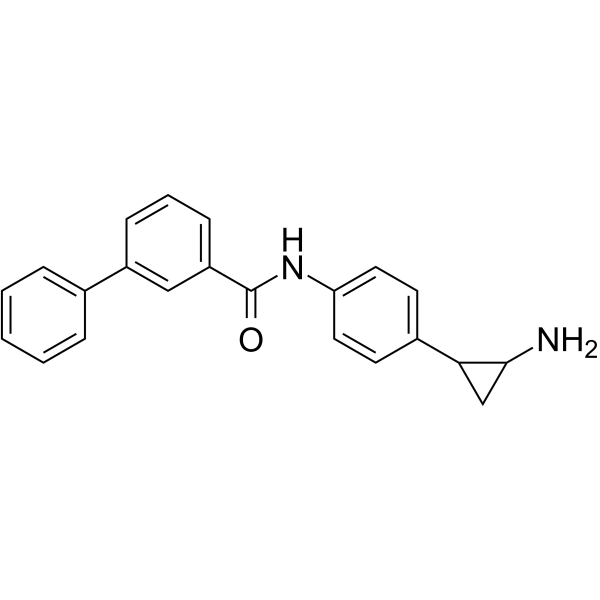
-
- HY-144757
-
|
|
Histone Demethylase
Monoamine Oxidase
|
Cancer
|
|
LSD1-IN-16 (compound 4b) is a potent LSD1 inhibitor. LSD1-IN-16 can inhibit LSD1-CoREST, MAO-A and MAO-B, with IC50 values of 0.015, 0.024, and 0.366 μM, respectively. LSD1-IN-16 displays cell growth arrest in prostate cancer LNCaP cells, with an IC50 of 15.2 μM .
|
-
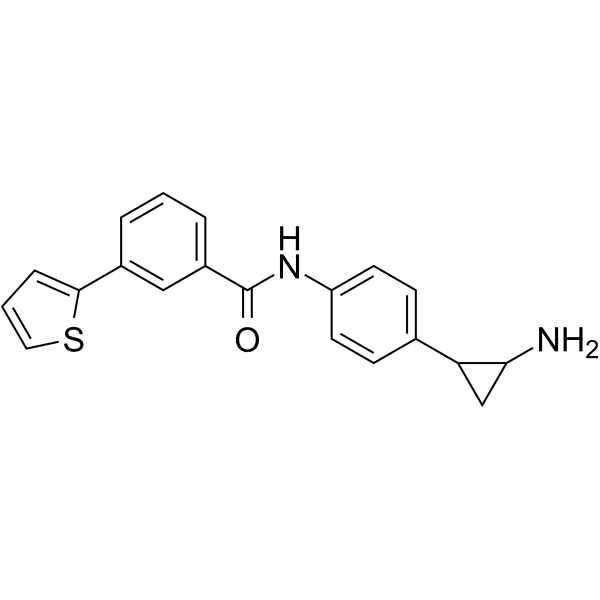
-
- HY-144758
-
|
|
Histone Demethylase
Monoamine Oxidase
|
Cancer
|
|
LSD1-IN-17 (compound 5b) is a potent LSD1 inhibitor. LSD1-IN-17 can inhibit LSD1-CoREST, MAO-A and MAO-B, with IC50 values of 0.005, 0.028, and 0.820 μM, respectively. LSD1-IN-17 displays cell growth arrest in prostate cancer LNCaP cells, with an IC50 of 17.2 μM .
|
-
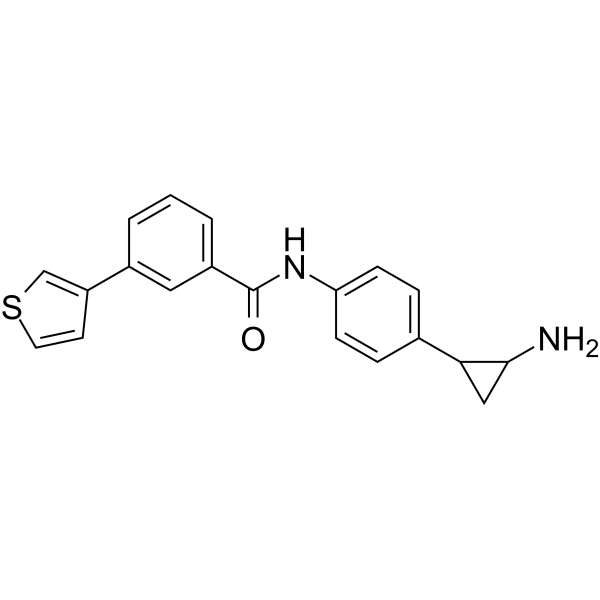
-
- HY-N3999
-
|
ESK246
|
Others
|
Cancer
|
|
Venuloside A is a potent inhibitor of LAT3. Venuloside A inhibits the leucine uptake in LNCaP prostate cancer cells with an IC50 of 8.12 μM .
|
-
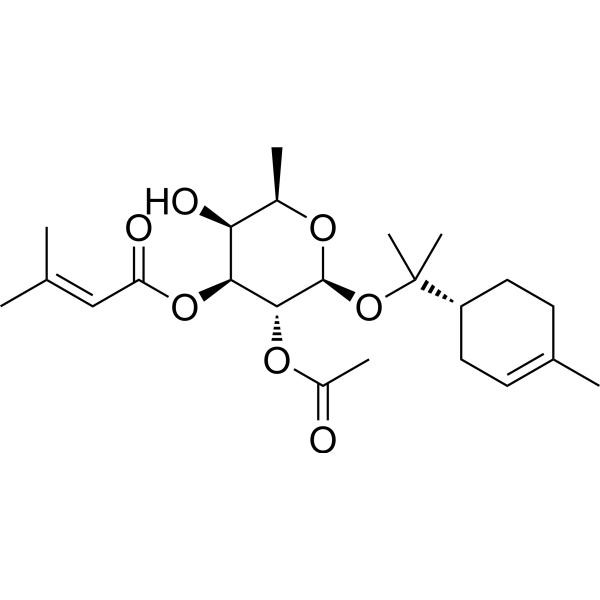
-
- HY-70002S
-
|
Enzalutamide-d3; MDV3100-d3; HC-1119
|
|
|
|
Deutenzalutamide (Enzalutamide-d3) is a developed deuterium labeled Enzalutamide (MDV3100). Enzalutamide is an androgen receptor (AR) antagonist with an IC50 of 36 nM in LNCaP prostate cells .
|
-
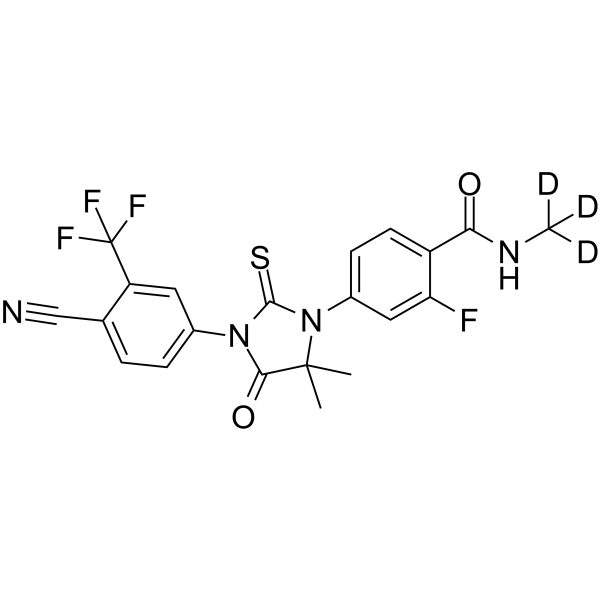
-
- HY-13626
-
|
ES-285
|
PKC
|
Cancer
|
|
Spisulosine (ES-285) is an antiproliferative (antitumoral) compound of marine origin. Spisulosine inhibits the growth of the prostate PC-3 and LNCaP cells through intracellular ceramide accumulation and PKCζ activation .
|
-
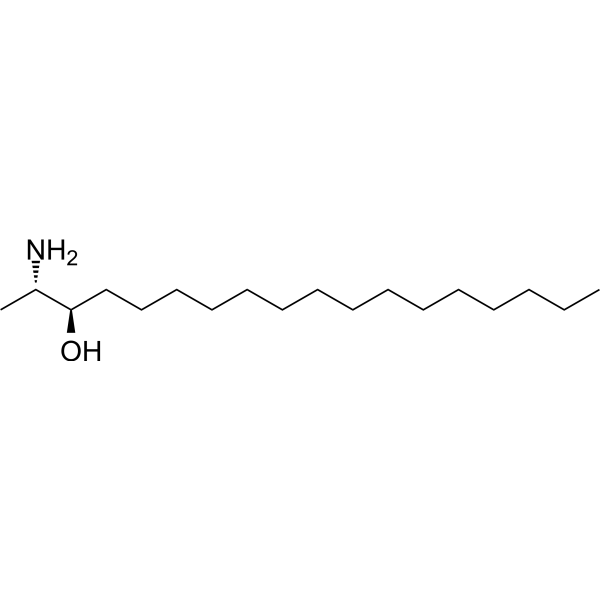
-
- HY-N8856
-
|
|
Others
|
Others
|
|
Angelol M,isolated from the roots of Angelica gigas Nakai, shows activity in inhibiting prostate specific antigen (PSA) secreted from androgen dependent prostate cancer cell line, LNCaP cells .
|
-
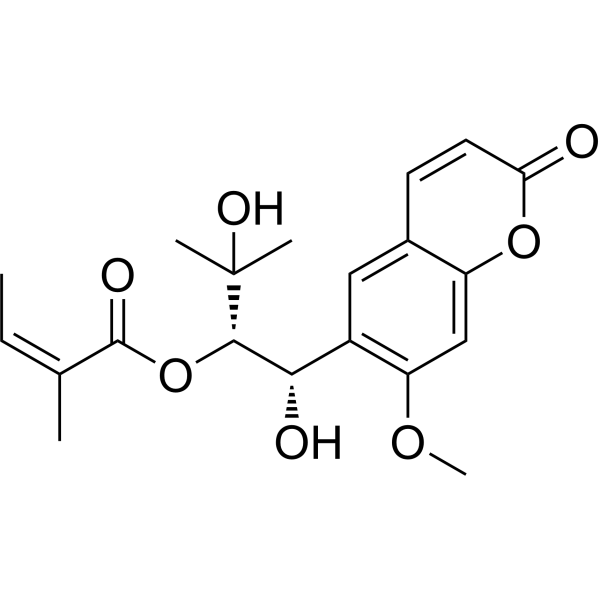
-
- HY-13626S
-
|
|
Isotope-Labeled Compounds
PKC
|
Cancer
|
|
Spisulosine-d3 is deuterium labeled Spisulosine. Spisulosine (ES-285) is an antiproliferative (antitumoral) compound of marine origin. Spisulosine inhibits the growth of the prostate PC-3 and LNCaP cells through intracellular ceramide accumulation and PKC
|
-
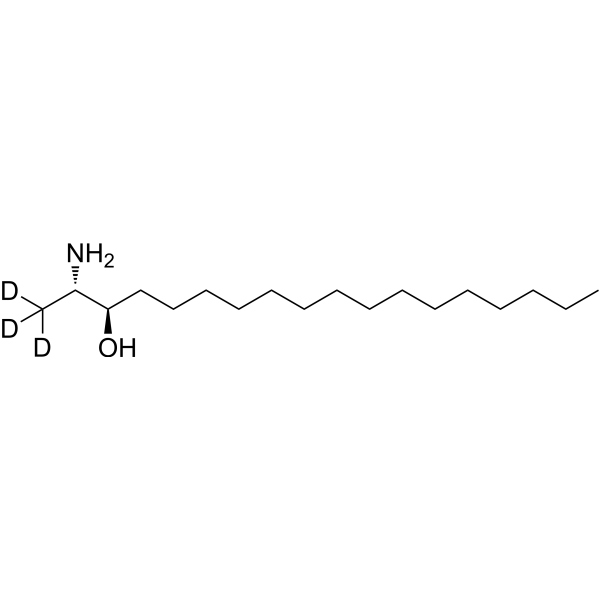
-
- HY-147937
-
|
|
Akt
|
Cancer
|
|
AKT-IN-13 (compound 4b) is a potent Akt inhibitor with IC50s of 1.6 nM, 2.4 nM and 0.3 nM for Akt1, Akt2 and Akt3, respectively. AKT-IN-13 can be used for researching anticancer .
|
-
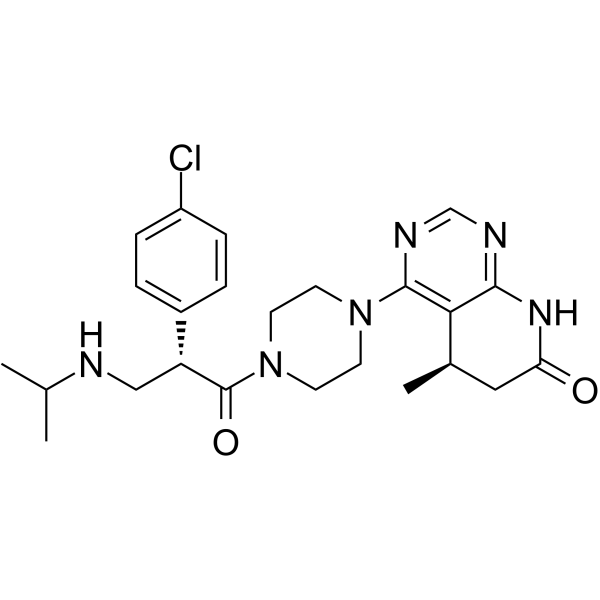
-
- HY-157460
-
|
|
Epigenetic Reader Domain
|
Cancer
|
|
BRD4 Inhibitor-29 (SQ-17) is a BRD4 inhibitor, with an IC50 of <100 nM. BRD4 Inhibitor-29 shows antiproliferative effect against prostate cancer cells .
|
-
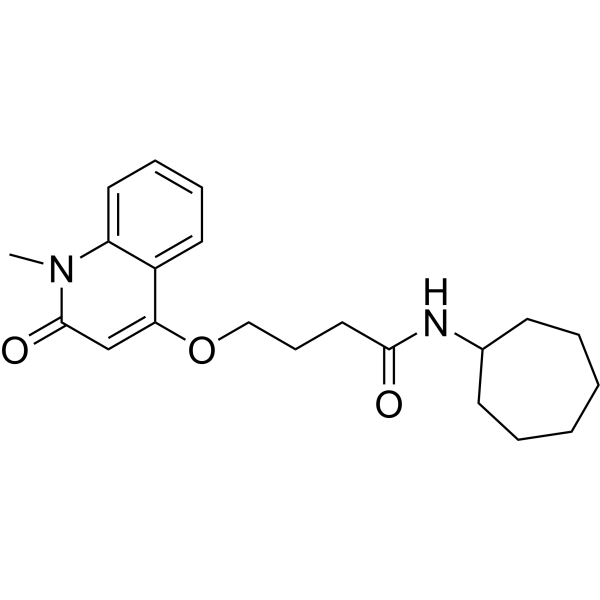
-
- HY-118091A
-
|
LY300502
|
Others
|
Cancer
|
|
Bexlosteride (LY300502) is a benzoquinolinone human type I 5α-reductase inhibitor. Bexlosteride shows metabolic inhibitory, antiproliferative, and antisecretory effects in LNCaP human prostatic adenocarcinoma cell cultures. Bexlosteride can be used for the research of prostatic cancer .
|
-
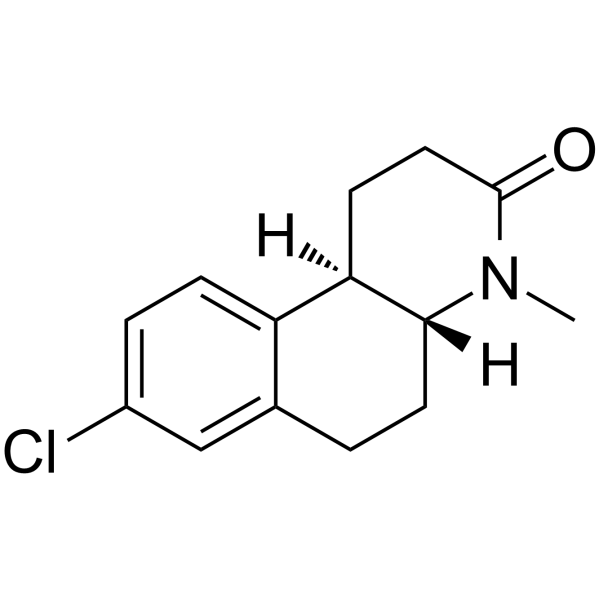
-
- HY-156778
-
|
|
Others
|
Cancer
|
|
Antitumor agent-120 (compound 1) is a flavonoid compound isolated from Kudzu root.Antitumor agent-120 has no significant inhibitory activity against LNCaP and PC3 cancer cells, with IC50s >50 μM .
|
-
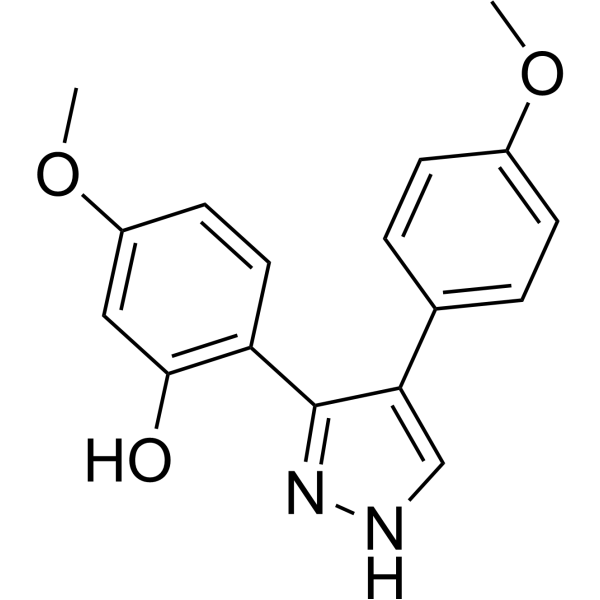
-
- HY-142772
-
|
|
Epigenetic Reader Domain
|
Cancer
|
|
Y08284 is a potent, selective, oral active CBP bromodomain inhibitor with an IC50 of 4.21 nM. Y08284 suppresses the proliferation of prostate cancer cell lines LNCaP, C4-2B, and 22Rv1. Antitumor activity .
|
-
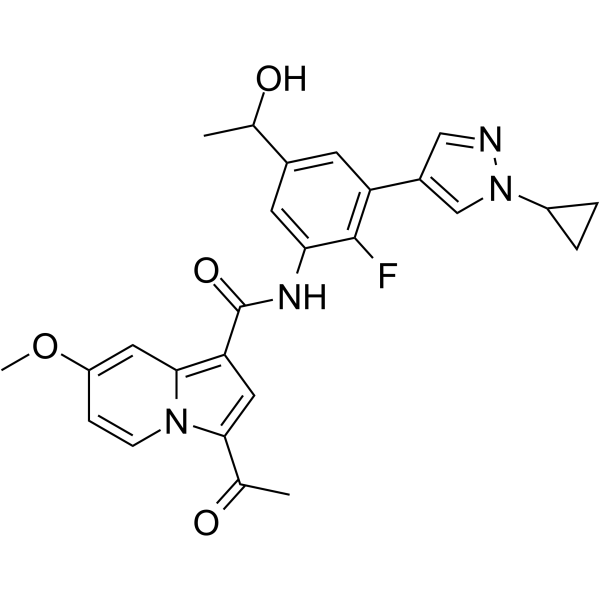
-
- HY-N1338
-
|
NSC 122417
|
mTOR
Akt
|
Cancer
|
|
Royleanone, a diterpenoid isolated from plants, inhibits the proliferation of cancer cells by inducing cell cycle arrest and mitochondria-mediated apoptosis, also inhibits cell migration potential, inhibits mTOR/PI3/AKT signaling pathway in LNCaP prostate cancer cells .
|
-
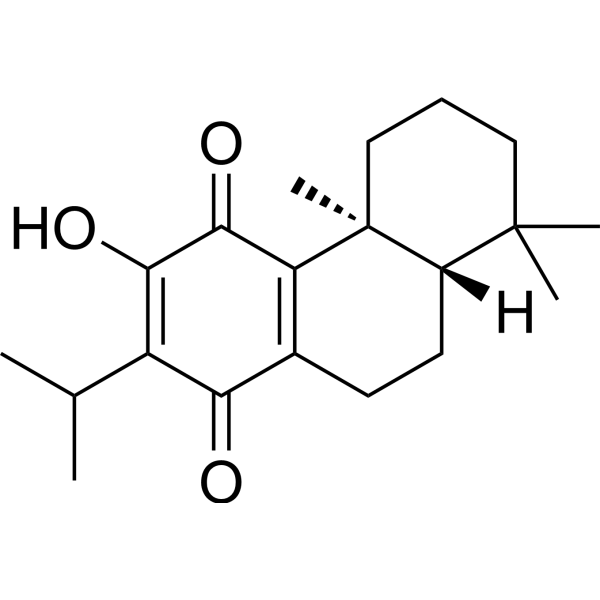
-
- HY-139970
-
|
|
Androgen Receptor
|
Endocrinology
Cancer
|
|
VPC-13789 is a potent, selective, and orally bioavailable antiandrogen. VPC-13789 can be used for the research of castration-resistant prostate cancer (CRPC) therapeutics. VPC-13789 inhibits androgen receptor (AR) transcriptional activity in LNCaP cells (IC50=0.19 μM) .
|
-
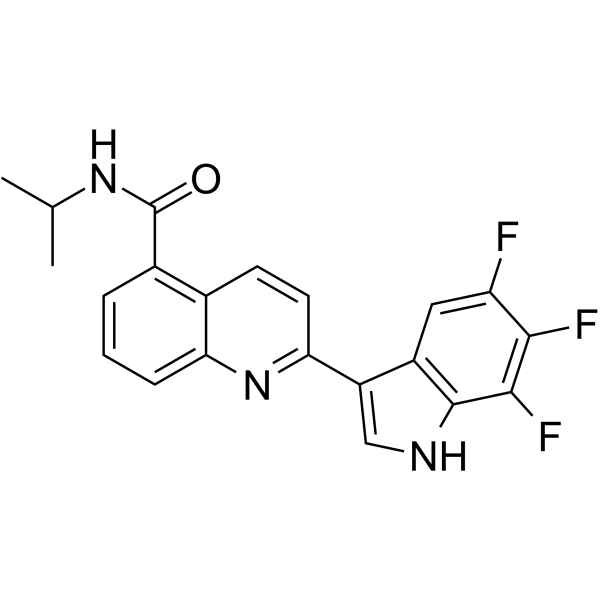
-
- HY-130992
-
|
|
Androgen Receptor
Ligands for Target Protein for PROTAC
|
Cancer
|
|
Androgen receptor antagonist 1 is an orally available full androgen receptor (AR) antagonist with an IC50 of 59 nM . Androgen receptor antagonist 1 (Compound 6) can be used in the synthesis of PROTAC AR degraders, which results 24% and 47 % AR protein degradation in LNCaP cells at 1 μM and 10 μM, respectively .
|
-
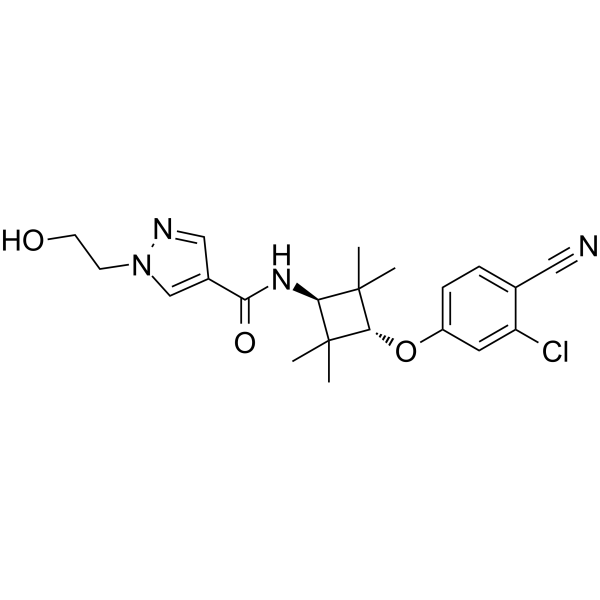
-
- HY-144667
-
|
|
Aldehyde Dehydrogenase (ALDH)
|
Cancer
|
|
ALDH1A3-IN-1 (Compound 14) is a potent ALDH1A3 inhibitor, with an IC50 of 0.63 µM and a Ki of 0.46 µM. ALDH1A3-IN-1 can be studied in prostate cancer .
|
-
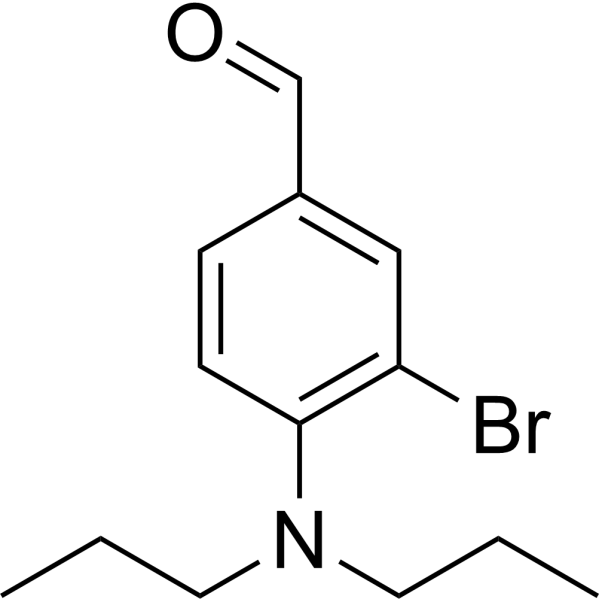
-
- HY-144127
-
|
|
Androgen Receptor
|
Cancer
|
|
AR antagonist 3 is a potent and selective androgen receptor (AR) antagonist with an IC50 of 0.47 µM. AR antagonist 3 exhibits a dose-dependent decrease of the FRET signal (IC50= 18.05 μM). AR antagonist 3 shows effective inhibition on tumor growth when administered intratumorally .
|
-
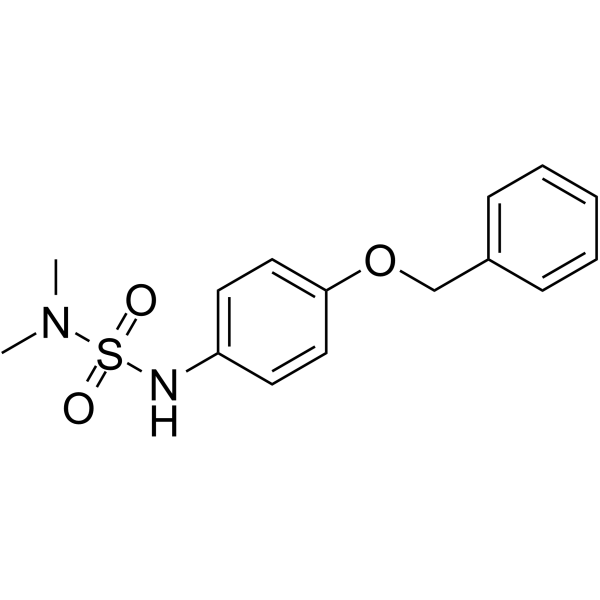
-
- HY-N7510
-
|
12-Methoxycarnosic acid
|
5 alpha Reductase
|
Infection
Cancer
|
|
12-O-Methylcarnosic acid (12-Methoxycarnosic acid), a diterpene carnosic acid isolated from the acetone extract of Salvia microphylla, is an active constituent of 5α-reductase inhibition with an IC50 value of 61.7 μM. 12-O-Methylcarnosic acid inhibits proliferation in LNCaP cells. 12-O-Methylcarnosic acid has antioxidant, anti-cancer and antimicrobial activity .
|
-
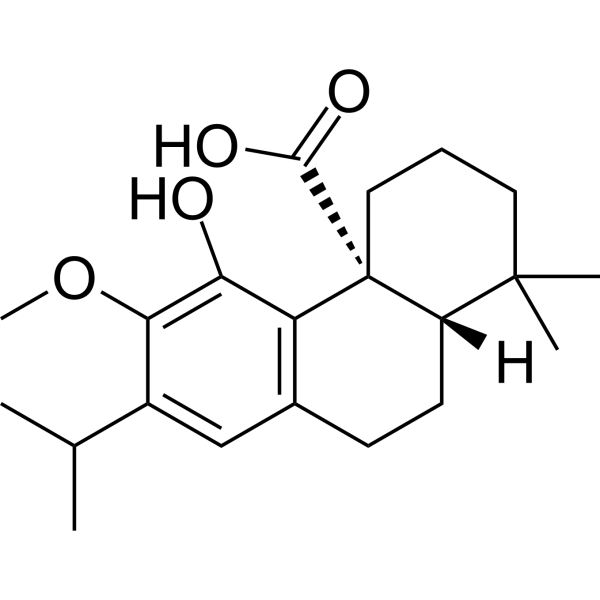
-
- HY-W748509
-
|
|
Caspase
Apoptosis
|
Cancer
|
|
Pipernonaline is a piperine derivative with antiprostate cancer activity. Pipernonaline inhibits the proliferation of androgen-dependent/independent LNCaP/PC-3 prostate cells. Pipernonaline activates caspase-3 and promotes procaspase-3/PARP cleavage. Pipernonaline also mediates reactive oxygen species (ROS) production, increased intracellular Ca(2+), and mitochondrial membrane depolarization .
|
-
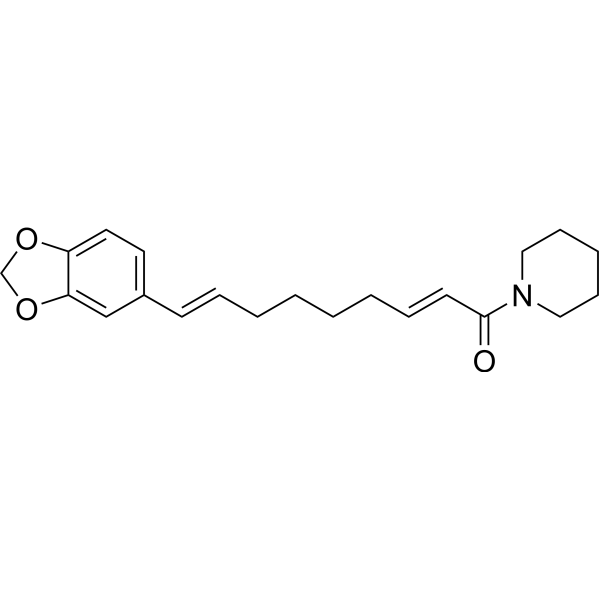
-
- HY-13941
-
|
1-NA-PP 1
|
Src
PKD
|
Cancer
|
|
1-Naphthyl PP1 (1-NA-PP 1) is a selective inhibitor of src family kinases and Protein Kinase D. 1-Naphthyl PP1 inhibits v-Src and c-Fyn, c-Abl, CDK2 and CAMK II with IC50s of 1.0, 0.6, 0.6, 18 and 22 μM, respectively .
|
-
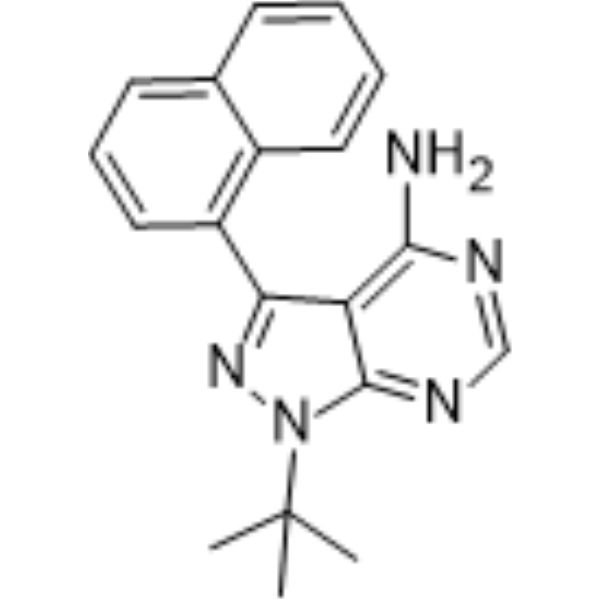
-
- HY-121088
-
|
|
Others
|
Cardiovascular Disease
Others
|
|
Ceefourin 2 is a potent and highly selective inhibitor of MRP4. Ceefourin 2 inhibits the transport of MRP4 substrates but is not selective for other ABC transporters. Ceefourin 2 shows lower cytotoxicity and higher microsomal and acid stability .
|
-
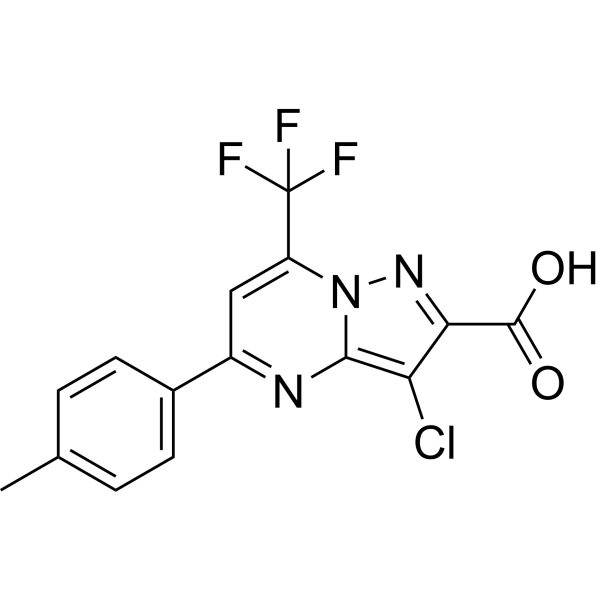
-
- HY-133045
-
|
|
Ligands for E3 Ligase
|
Cancer
|
|
VHL Ligand 8 is a VHL ligand. VHL Ligand 8 can be used to synthesize ARD-266 (HY-133020), a highly potent and VHL E3 ligase-based androgen receptor (AR) PROTAC degrader. ARD-266 effectively induces degradation of AR protein in AR-positive LNCaP, VCaP, and 22Rv1 prostate cancer cell lines with DC50 values of 0.2-1 nM .
|
-
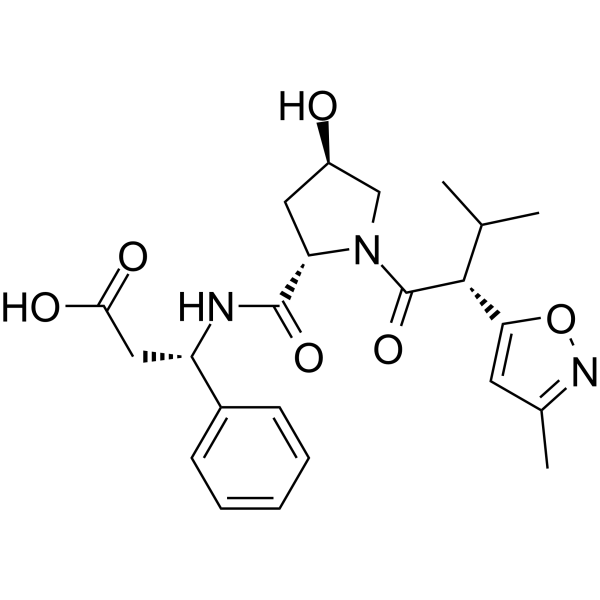
-
- HY-141487
-
-
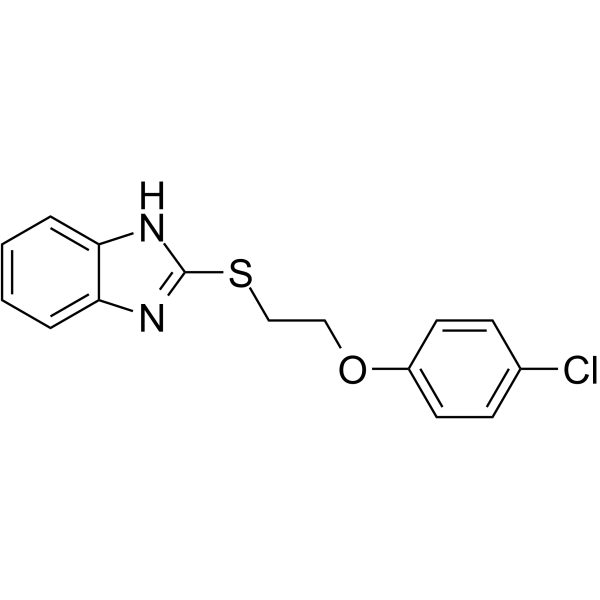
-
- HY-147291
-
|
|
c-Myc
PARP
Apoptosis
|
Cancer
|
|
VPC-70063 is a potent Myc-Max inhibitor with an IC50 value of 8.9 μM for Myc-Max transcriptional activity inhibition. VPC-70063 reduces UBE2C promotor activity and AR-V7 levels, and induces PARP cleavage. VPC-70063 induces apoptosis and blocks Myc-Max interactions with DNA. VPC-70063 can be used for researching anticancer .
|
-
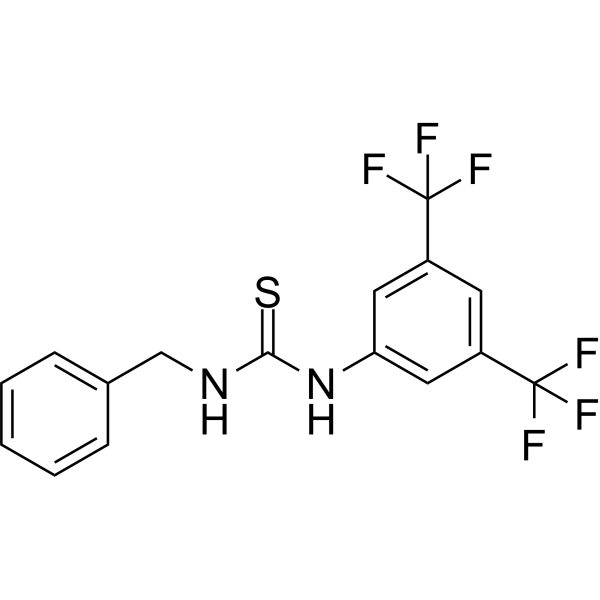
-
- HY-151532
-
|
|
Epigenetic Reader Domain
|
Cancer
|
|
PBRM1-BD2-IN-5 is a potent PBRM1 Bromodomain inhibitor with Kd values of 1.5 μM and 3.9 μM for PBRM1-BD2 and PBRM1-BD5, respectively, and an IC50 value of 0.26 μM for PBRM1-BD2. PBRM1-BD2-IN-5 reduces the binding of full-length PBRM1 within the PBAF complex in cell lysates to acetylated histone peptide. PBRM1-BD2-IN-5 can be used to research anticancer .
|
-
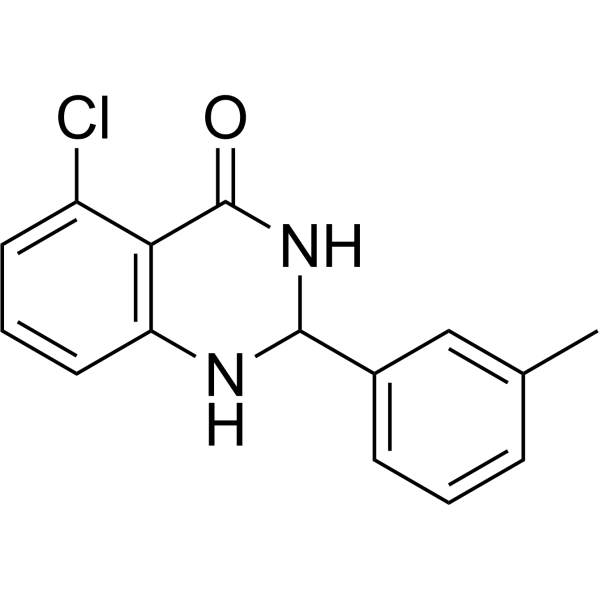
-
- HY-151538
-
|
|
Epigenetic Reader Domain
|
Cancer
|
|
PBRM1-BD2-IN-8 (compound 34) is a potent PBRM1 Bromodomain inhibitor (PBRM1-BD2 Kd=4.4 μM, PBRM1-BD2 IC50=0.16 μM; PBRM1-BD5 Kd=25 μM). PBRM1-BD2-IN-8 shows anti-cancer activity .
|
-
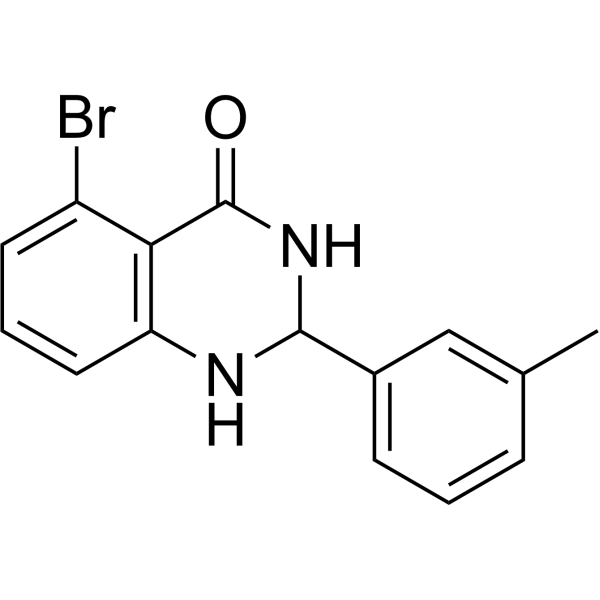
- HY-152512
-
|
|
Androgen Receptor
|
Cancer
|
|
RLA-4842 is an iron activator containing anti-androgen. RLA-4842 has anti-proliferative activity on metastatic castration-resistant prostate cancer (mCRPC) cell line .
|
-
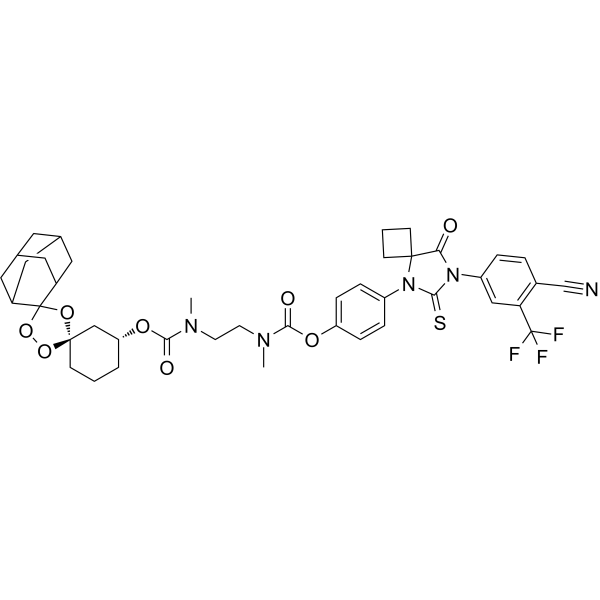
- HY-149434
-
|
|
Androgen Receptor
Apoptosis
|
Cancer
|
|
PROTAC AR-NTD antagonist 1 (compound 18) is a small molecule protein-targeting chimera (PROTACs) targeting the Androgen Receptor AR-V7. PROTAC AR-NTD antagonist 1 antagonizes the N-terminal domain of AR (AR-NTD), degrades AR-V7 protein, and induces apoptosis in prostate cancer (PC) cells. The efficiencies of PROTAC AR-NTD antagonist 1 in degrading AR-V7 in VCaP cells were 62.2% (1 μM) and 71.1% (5 μM), respectively .
|
-
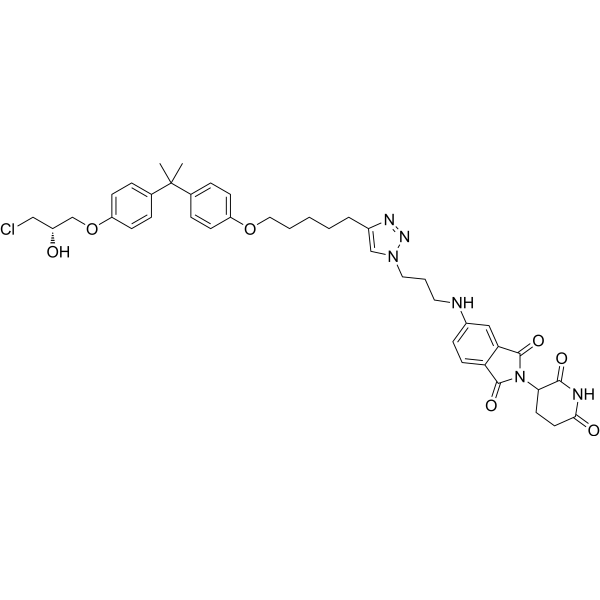
- HY-107336
-
|
Beveno
|
COX
|
Inflammation/Immunology
|
|
Cyclovalone (Beveno) is a synthetic curcumin derivate, which inihibits cyclooxygenase and exhibits anti-inflammatory, antitumor and antioxidant activities . Cyclovalone inhibits cell proliferation in normal and malignant prostatic cells. Cyclovalone ist orally active .
|
-
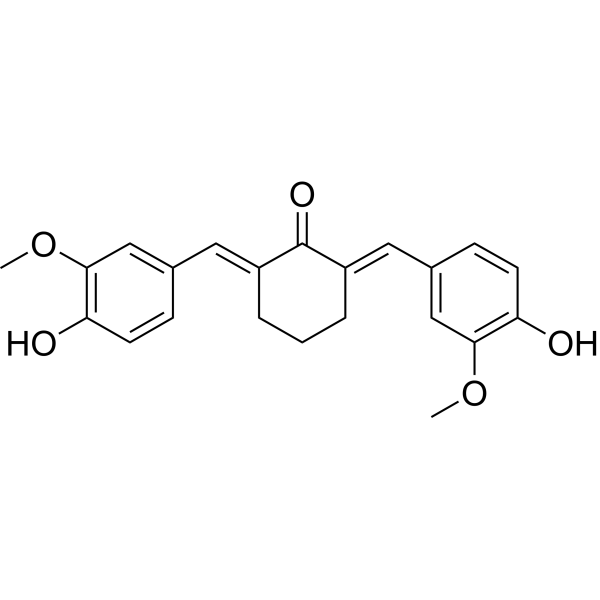
- HY-133020
-
|
|
PROTACs
Androgen Receptor
|
Cancer
|
|
ARD-266 is a highly potent and von Hippel-Lindau E3 ligase-based Androgen Receptor (AR) PROTAC degrader. ARD-266 effectively induces degradation of AR protein in AR-positive LNCaP, VCaP, and 22Rv1 prostate cancer cell lines with DC50 values of 0.2-1 nM . ARD-266 is a click chemistry reagent, it contains an Alkyne group and can undergo copper-catalyzed azide-alkyne cycloaddition (CuAAc) with molecules containing Azide groups.
|
-
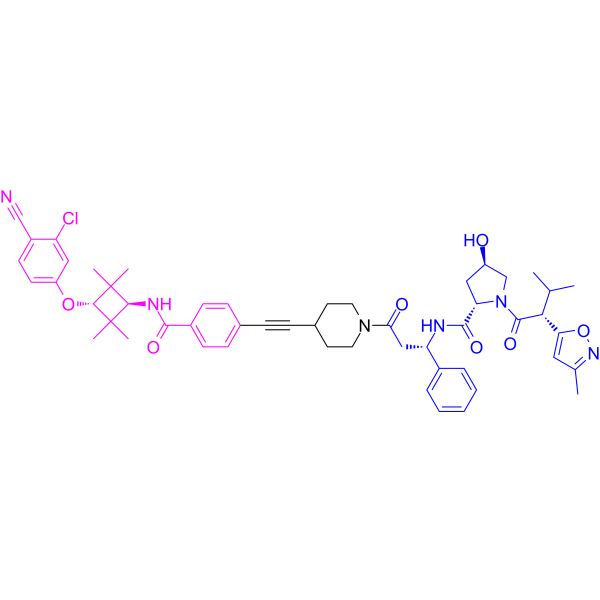
- HY-17423
-
|
|
HIV
Reverse Transcriptase
Telomerase
Apoptosis
|
Infection
Cancer
|
|
Abacavir is an orally active and competitive nucleoside reverse transcriptase inhibitor. Abacavir can inhibits the replication of HIV. Abacavir shows anticancer activity in prostate cancer cell lines. Abacavir can trespass the blood-brain-barrier and suppresses telomerase activity .
|
-
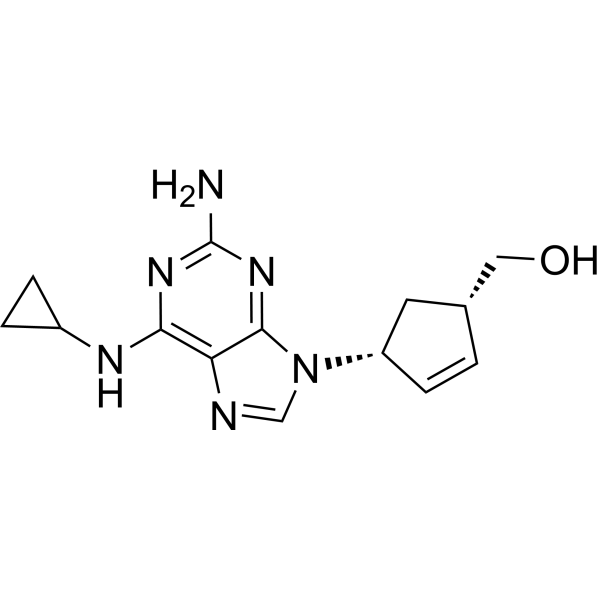
- HY-17423A
-
|
Abacavir Hemisulfate; ABC sulfate
|
Reverse Transcriptase
HIV
Telomerase
Apoptosis
|
Infection
|
|
Abacavir sulfate (Abacavir Hemisulfate) is a competitive, orally active nucleoside reverse transcriptase inhibitor. Abacavir sulfate can inhibits the replication of HIV. Abacavir sulfate shows anticancer activity in prostate cancer cell lines. Abacavir sulfate can trespass the blood-brain-barrier and suppresses telomerase activity .
|
-
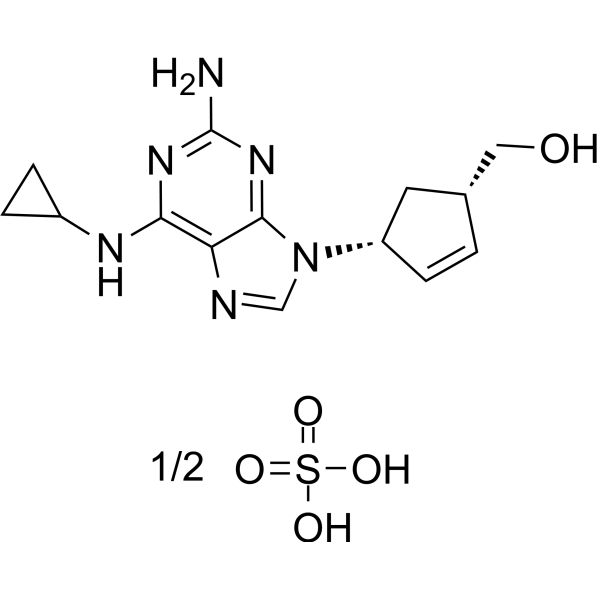
- HY-130845
-
-
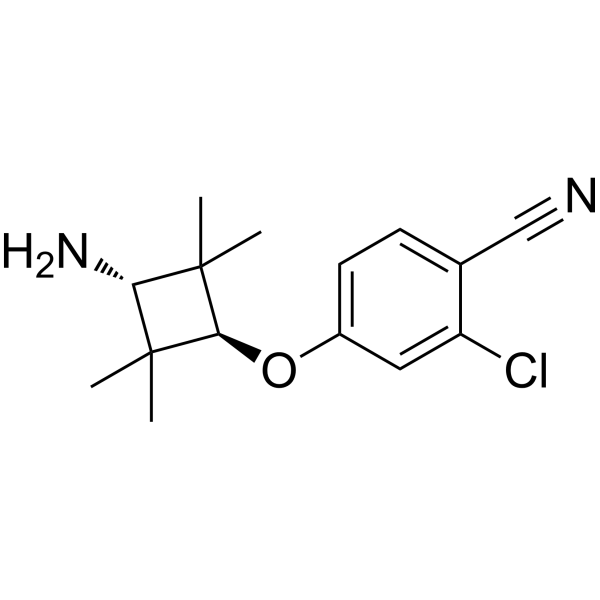
- HY-146027
-
|
|
Androgen Receptor
|
Cancer
|
|
Androgen receptor antagonist 4 (Compound AT2) is an androgen receptor (AR) antagonist with an IC50 of 0.15 μM. Androgen receptor antagonist 4 efficiently antagonizes AR transcriptional activity, suppresses downstream target gene of AR, and blocks the DHT-induced AR nuclear translocation. Androgen receptor antagonist 4 shows anticancer activities .
|
-
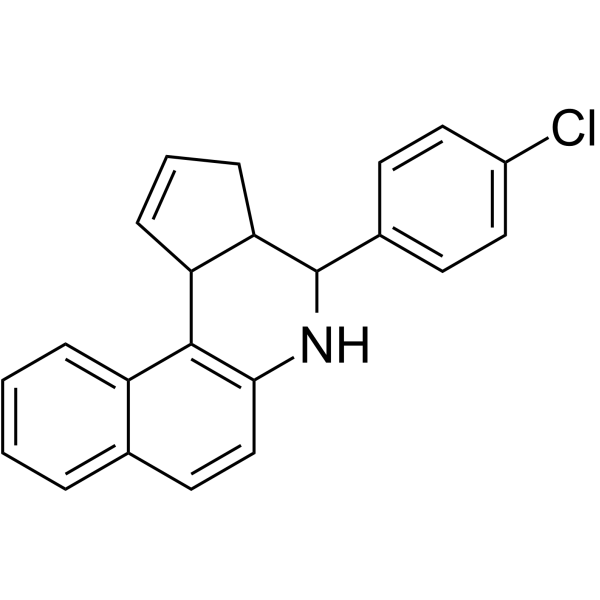
- HY-146026
-
|
|
Androgen Receptor
|
Cancer
|
|
Androgen receptor antagonist 3 (Compound C18) is an androgen receptor (AR) antagonist with an IC50 of 2.4 μM. Androgen receptor antagonist 3 shows anticancer activities .
|
-
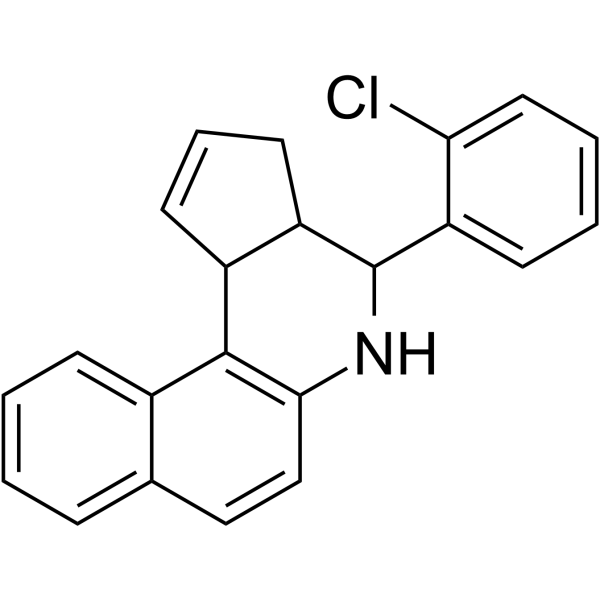
- HY-17423B
-
|
|
HIV
Reverse Transcriptase
Telomerase
Apoptosis
|
Infection
Cancer
|
|
Abacavir monosulfate is a competitive, orally active nucleoside reverse transcriptase inhibitor. Abacavir monosulfate can inhibits the replication of HIV. Abacavir monosulfate shows anticancer activity in prostate cancer cell lines. Abacavir monosulfate can trespass the blood-brain-barrier and suppresses telomerase activity .
|
-
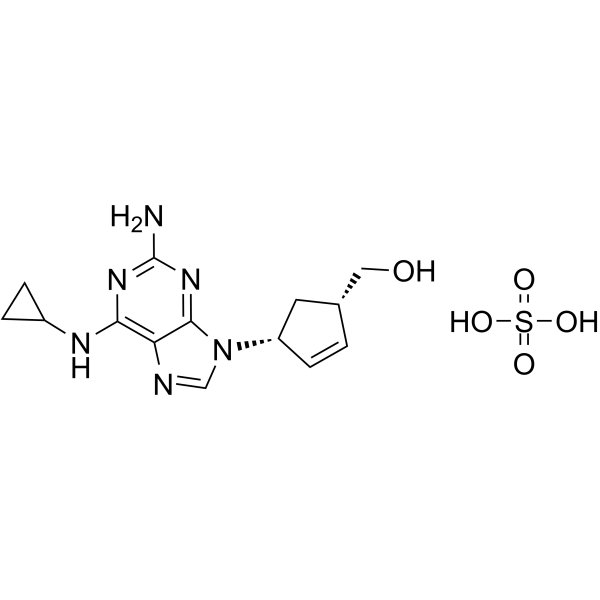
- HY-17423E
-
|
|
HIV
Apoptosis
Reverse Transcriptase
Telomerase
|
Infection
Cancer
|
|
Abacavir hydrochloride is a competitive, orally active nucleoside reverse transcriptase inhibitor. Abacavir hydrochloride can inhibits the replication of HIV. Abacavir hydrochloride shows anticancer activity in prostate cancer cell lines. Abacavir hydrochloride can trespass the blood-brain-barrier and suppresses telomerase activity .
|
-
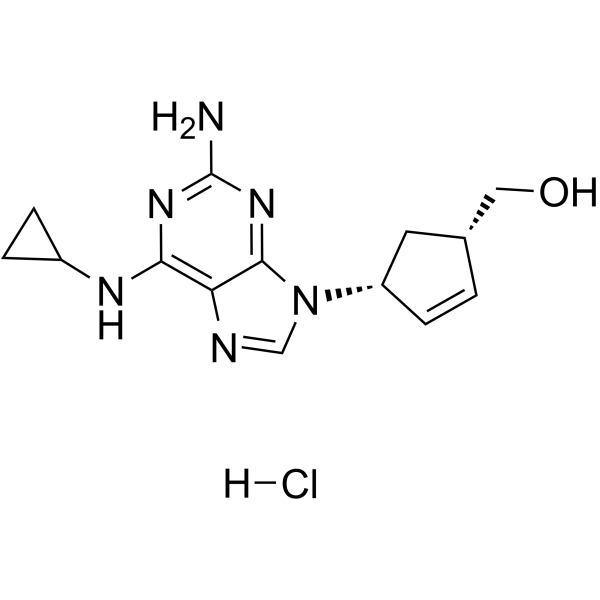
- HY-151533
-
|
|
Epigenetic Reader Domain
|
Cancer
|
|
PBRM1-BD2-IN-6 is a potent PBRM1 bromodomain inhibitor with an IC50 value of 0.22 µM. PBRM1-BD2-IN-6 shows antiproliferation activity. PBRM1-BD2-IN-6 has the potential for the research of PBRM1-dependent cancer .
|
-
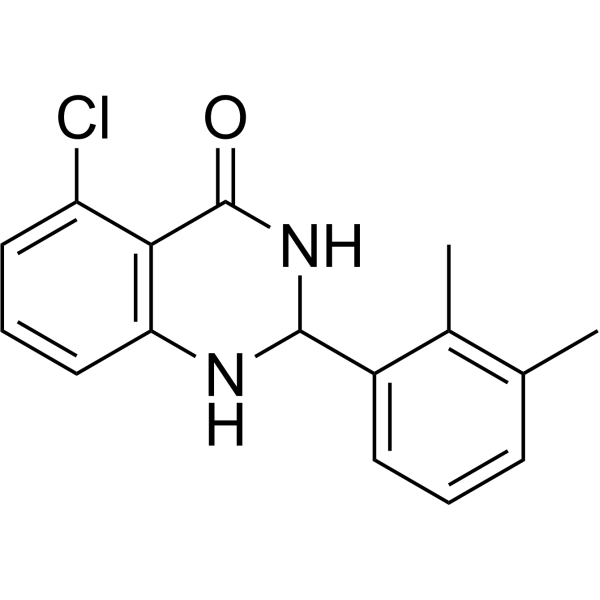
- HY-152520
-
|
|
Androgen Receptor
|
Cancer
|
|
RLA-5331 is an iron activator containing anti-androgen. RLA-5331 has anti-proliferative activity on metastatic castration-resistant prostate cancer (mCRPC) cell line .
|
-
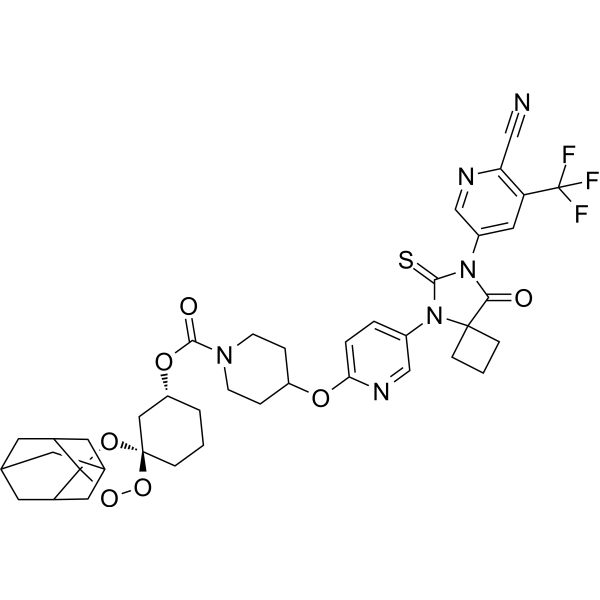
- HY-130845A
-
-
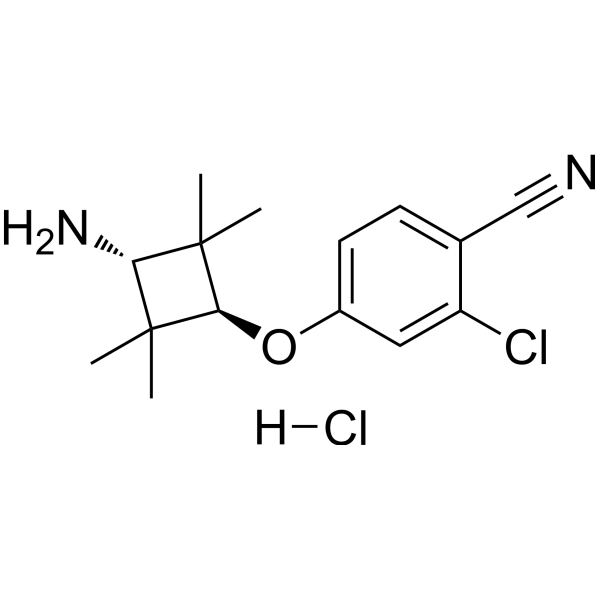
- HY-106253
-
-
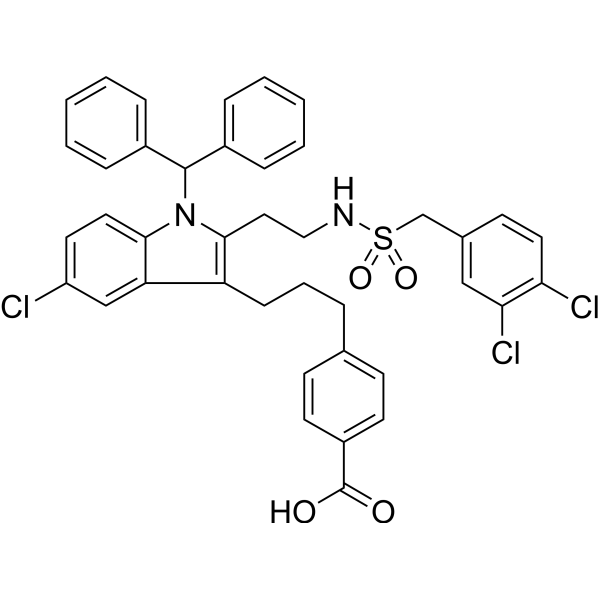
- HY-160020
-
|
|
Androgen Receptor
|
Cancer
|
|
ET516 is a potent inhibitor of Androgen Receptor. ET516 significantly inhibits the proliferation and tumor growth of prostate cancer cells expressing AR-resistant mutants .
|
-
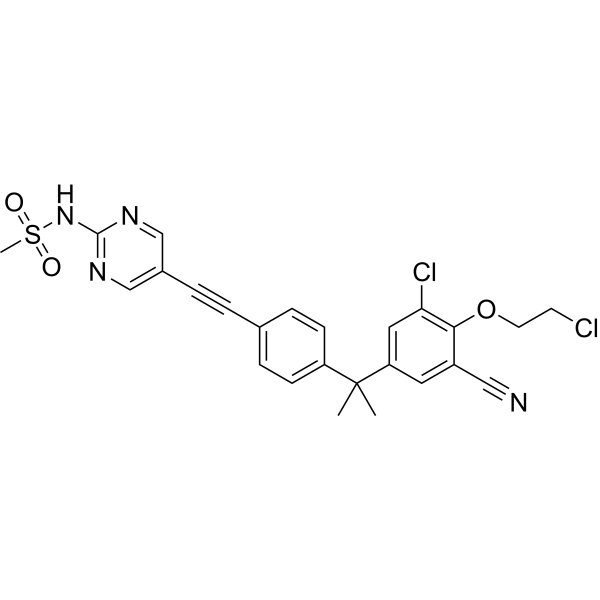
- HY-109015S
-
|
Chidamide-d4; HBI-8000-d4; CS 055-d4
|
Isotope-Labeled Compounds
HDAC
|
Cancer
|
|
Tucidinostat-d4 is the deuterium labeled Tucidinostat. Tucidinostat is a potent and orally bioavailable HDAC enzymes class I (HDAC1/2/3) and class IIb (HDAC10) inhibitor, with IC50s of 95, 160, 67 and 78 nM, respectively[1].
|
-
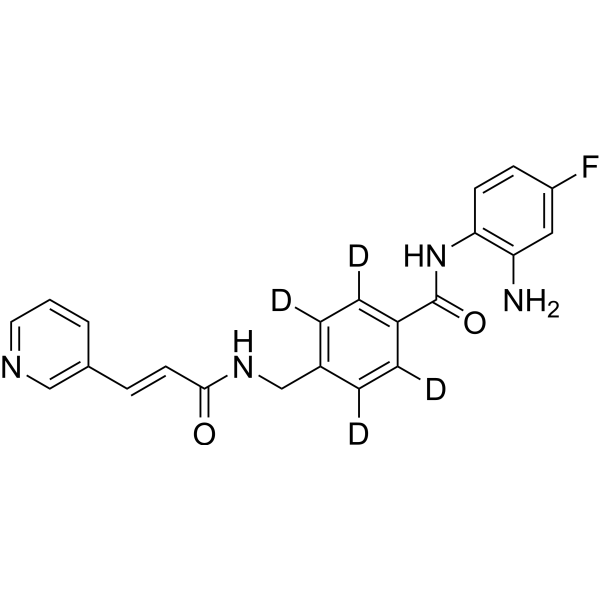
- HY-112090
-
|
|
Epigenetic Reader Domain
HIV
|
Infection
Inflammation/Immunology
Cancer
|
|
ABBV-744 is a first-in-class, orally active and selective inhibitor of the BDII domain of BET family proteins with IC50 values ranging from 4 to 18 nM for BRD2, BRD3, BRD4 and BRDT. ABBV-744 is primarily metabolized by CYP3A4 with agent-like properties enable the investigation of its antitumor efficacy and tolerability .
|
-
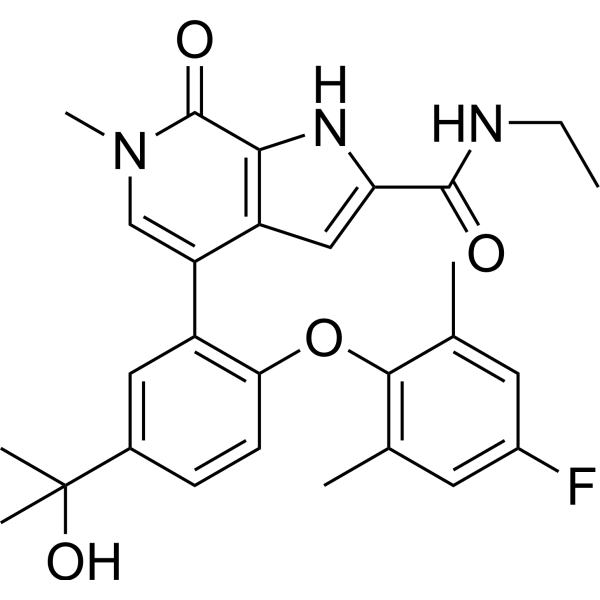
- HY-111145
-
|
|
Androgen Receptor
|
Cancer
|
|
RD162, a diarylthiohydantoin, is an orally active non-steroidal antiandrogen (NSAA). RD162 specifically binds to androgen receptor (AR). RD162 induces tumor regression in mouse models of castration-resistant human prostate cancer .
|
-
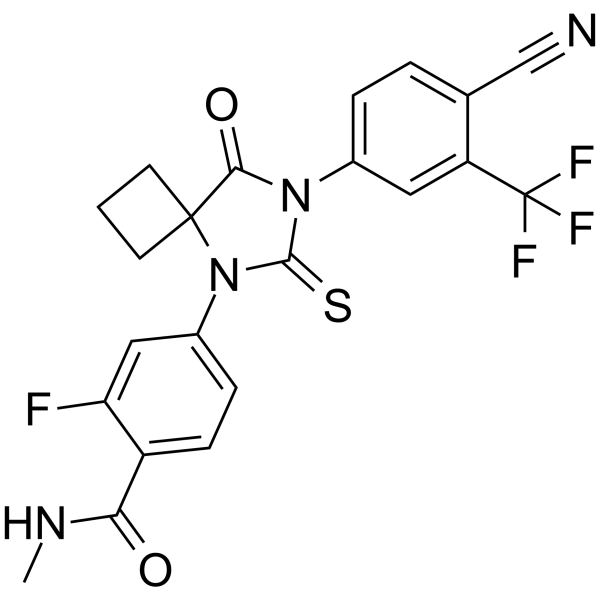
- HY-146396
-
|
|
Others
|
Cancer
|
|
Anticancer agent 51 (compound 3d) is a potent anticancer agent with an Ki of 731.62 nM. Anticancer agent 51 shows anticancer activity. Anticancer agent 51 has the potential for the research of prostate cancer .
|
-
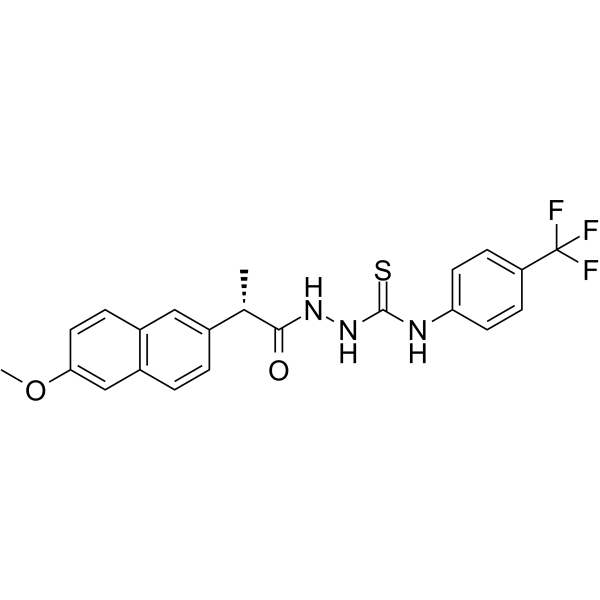
- HY-P99274
-
|
BI 836845; Anti-Human IGF1 and IGF2 Recombinant Antibody
|
IGF-1R
|
Cancer
|
|
Xentuzumab (Anti-Human IGF1 and IGF2 Recombinant Antibody; BI836845) is a recombinant a human monoclonal antibody that targets IGF ligands IGF1 and IGF2. Xentuzumab inhibits both of IGF1 and IGF2 growth-promoting signalling and suppresses AKT activation .
|
-

- HY-116895
-
|
|
Androgen Receptor
MAGL
|
Metabolic Disease
|
|
JJH260 is AIG1inhibitor, and inhibit the fluorophosphonate reactivity and fatty acid esters of hydroxy fatty acid (FAHFA) hydrolysis activity of AIG1in HEK293T cells, with IC50 values of 0.50 μM and 0.57 μM, respectively .
|
-
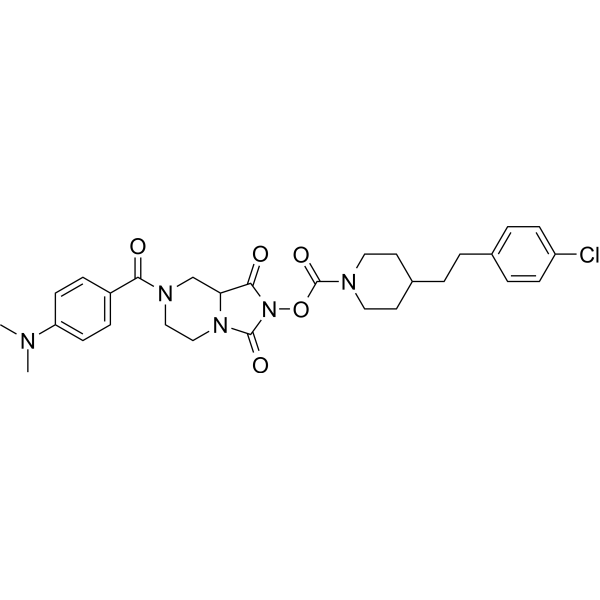
- HY-121065
-
|
IRC-083065
|
Phosphatase
|
Cancer
|
|
BN-82685 is a a quinone-based CDC25 inhibitor with IC50 of 201 nM, 117 nM, 109 nM, 160 nM, 249 nM, for CDC25C, CDC25C-cat, CDC25A, CDC25B2, CDC25B3, respectively. BN-82685 plays an important role in cancer research .
|
-
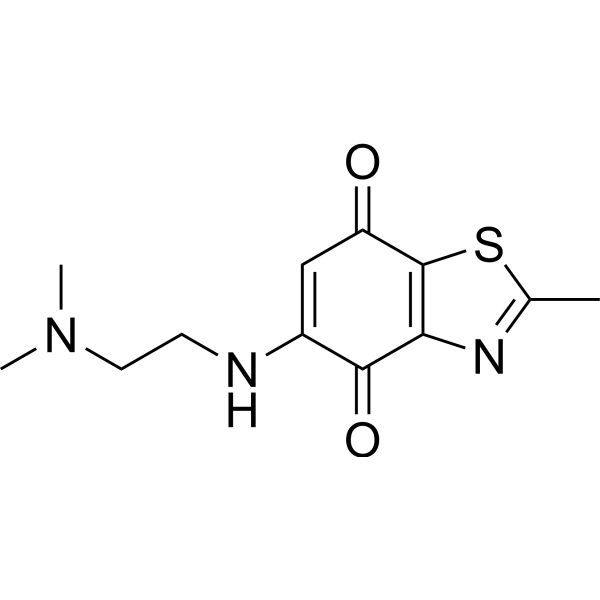
- HY-133044
-
|
|
PROTAC Linkers
|
Cancer
|
|
Boc-Pip-alkyne-Ph-COOH is a PROTAC linker, which refers to the alkyl/ether composition. Boc-Pip-alkyne-Ph-COOH can be used in the synthesis of a series of PROTACs, such as ARD-266 (HY-133020). ARD-266 effectively induces degradation of androgen receptor (AR) protein in AR-positive LNCaP, VCaP, and 22Rv1 prostate cancer cell lines with DC50 values of 0.2-1 nM . Boc-Pip-alkyne-Ph-COOH is a click chemistry reagent, it contains an Alkyne group and can undergo copper-catalyzed azide-alkyne cycloaddition (CuAAc) with molecules containing Azide groups.
|
-
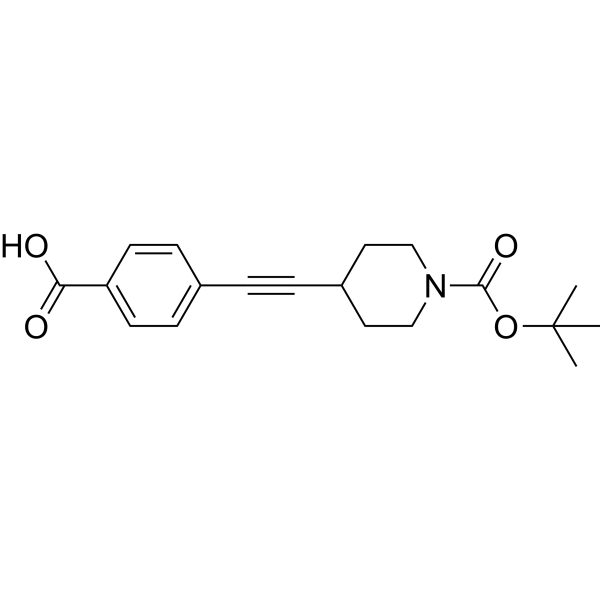
- HY-133537
-
|
|
Antibiotic
Fungal
ADC Cytotoxin
|
Infection
Cancer
|
|
Hygrolidin is a 16-membered macrolide antibiotic produced by Streptomyces hygroscopicus D-1166. Hygrolidin has anti-fungus activity against Valsa ceratosperma. Hygrolidin induces p21 expression and abrogates cell cycle progression at G1 and S phases. Hygrolidin has antitumor activity .
|
-
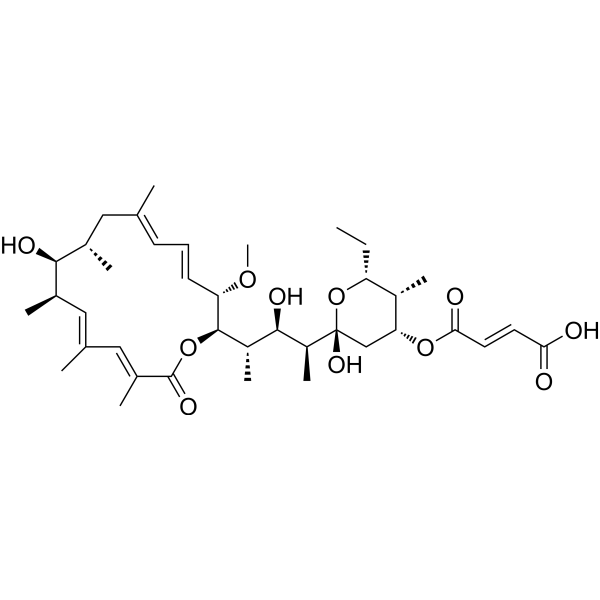
- HY-19747
-
HPOB
2 Publications Verification
|
HDAC
Apoptosis
|
Cancer
|
|
HPOB is a highly potent and selective inhibitor of HDAC6 with an IC50 of 56 nM. HPOB displays >30 fold less potent against other HDACs. HPOB enhances the effectiveness of DNA-damaging anticancer agents in transformed cells but not normal cells. HPOB does not block the ubiquitin-binding activity of HDAC6 .
|
-
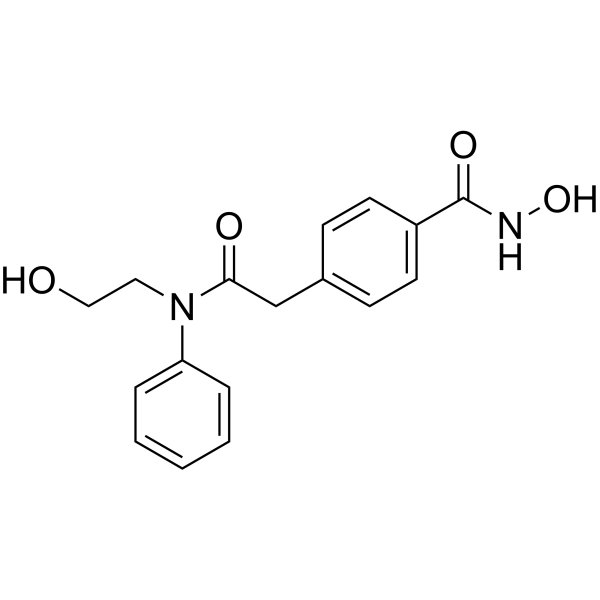
- HY-135732
-
|
|
Androgen Receptor
|
Cancer
|
|
SK33, a trifluoromethylated enobosarm analog, is a potent, and tissue selective anti-androgen. SK33reduces androgen receptor (AR) transcriptional activity .
|
-
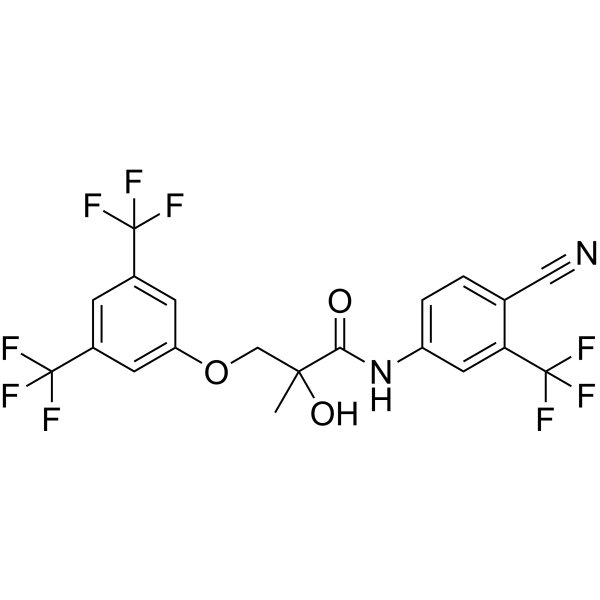
- HY-P99183
-
|
EMD 525797; DI17E6
|
Integrin
|
Cancer
|
|
Abituzumab (DI17E6) is a humanised anti-integrin αV monoclonal antibody (IgG2 type). Abituzumab effectively reduces the phosphorylation of FAK, Akt and ERK. Abituzumab can be used in cancer research, particularly in prostate cancer .
|
-

- HY-136582
-
|
Androgen receptor-IN-2
|
Androgen Receptor
|
Cancer
|
|
Masofaniten (Androgen receptor-IN-2) is a potent and orally active androgen receptor inhibitor. Masofaniten has antitumor activity against prostate cancer .
|
-
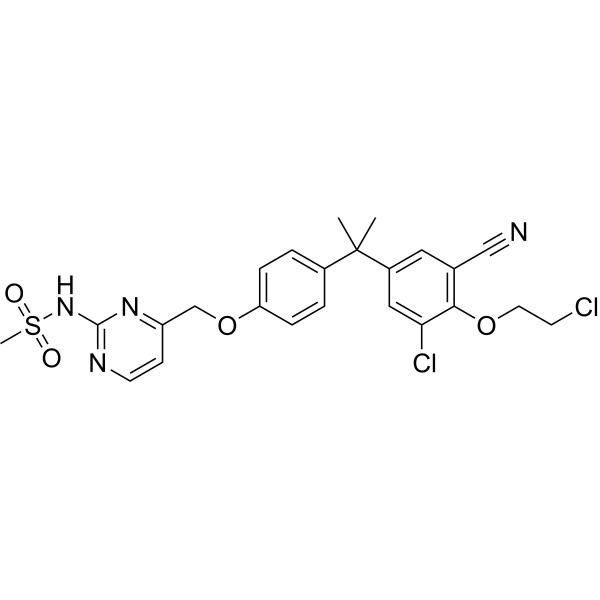
- HY-155543
-
|
|
Androgen Receptor
|
Cancer
|
|
Anticancer agent 135 (compound 26h) is a potent androgen receptor (AR) antagonist. Anticancer agent 135 can effectively block AR nuclear translocation and inhibit AR/AR-V7 heterodimerization, thereby inhibiting downstream gene transcription. Anticancer agent 135 displays potent robust efficacy in prostate cancer xenograft models .
|
-
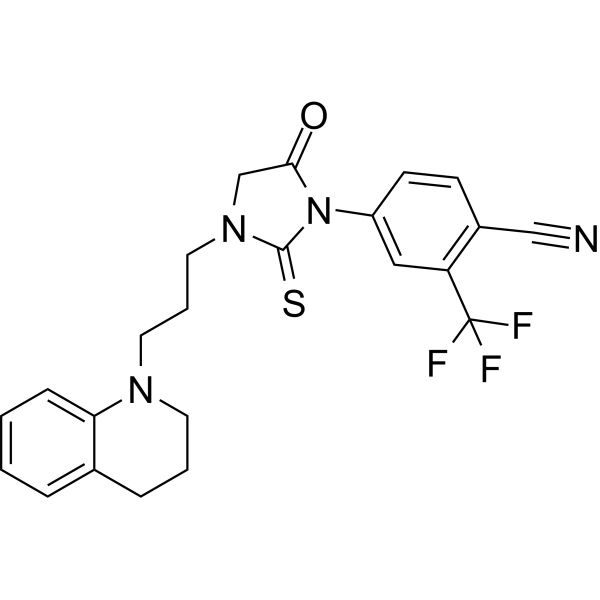
- HY-156111
-
|
|
PROTACs
Androgen Receptor
|
Cancer
|
|
ARD-1676 is an orally available androgen receptor (AR) PROTAC degrader, consisting of AR ligand and cereblon ligand. ARD-1676 has AR-degrading activity in vitro and in vivo and inhibits VCaP tumor growth in mouse xenograft tumor models .
|
-
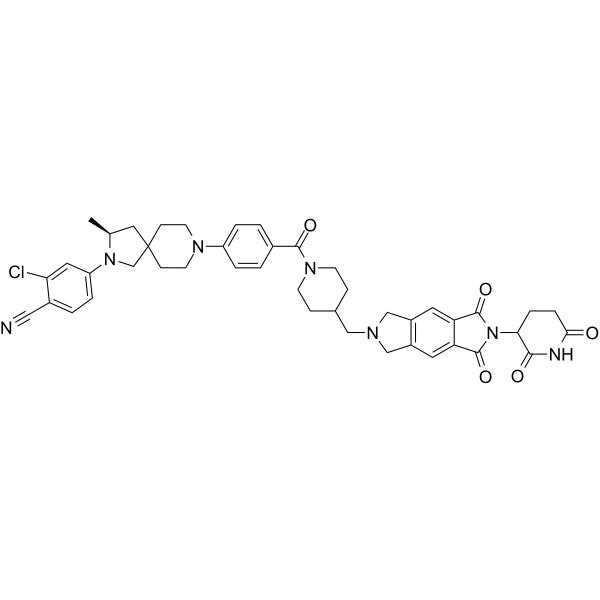
- HY-113574
-
|
|
HSP
|
Cancer
|
|
HSP90-IN-29 (Compound 13), a benzoxazole derivative, is a potent and selective HSP-90 inhibitor with an IC50 value of 30 nM. HSP90-IN-29 has antitumor activity .
|
-
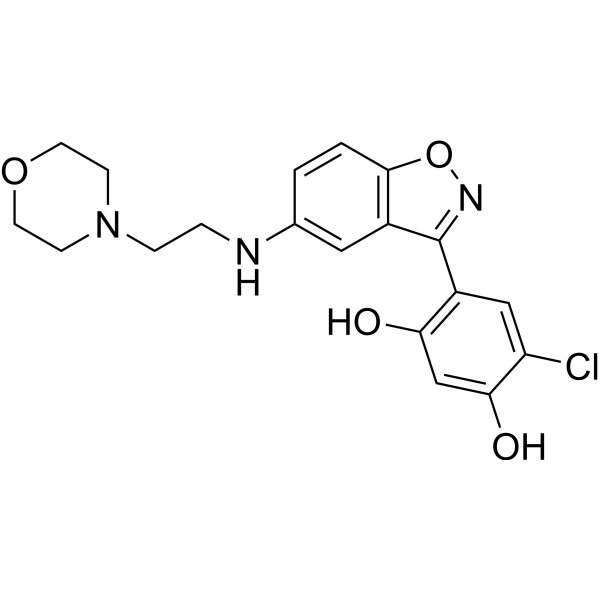
- HY-108250
-
|
|
Androgen Receptor
|
Cancer
|
|
(R)-Bicalutamide is the (R)-enantiomer of Bicalutamide (HY-14249). (R)-Bicalutamide is an androgen receptor (AR) antagonist, with antineoplastic activity. (R)-Bicalutamide is widely used for the research of prostate cancer .
|
-
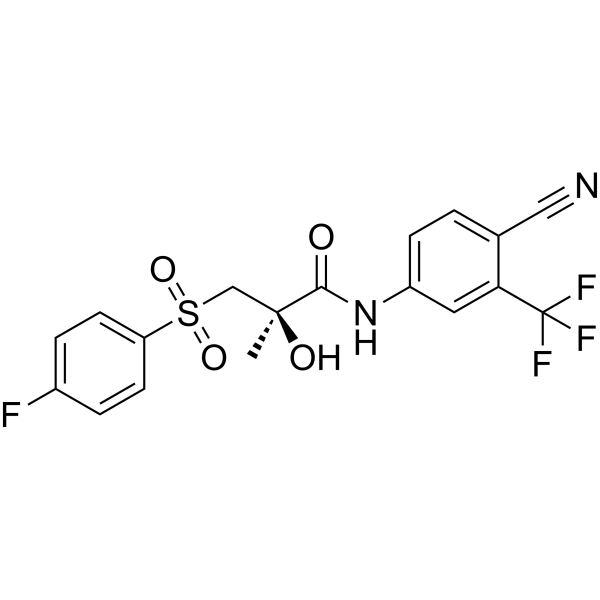
- HY-144636
-
|
|
Atg4
Cathepsin
Phospholipase
Autophagy
|
Cancer
|
|
Atg4B-IN-2 is a potent competitive Atg4B inhibitor with Ki value of 3.1 μM, also possesses declining PLA2 inhibitory potency, IC50s of 11 μM and 3.5 μM for Atg4B and PLA2, respectively. Atg4B-IN-2 enhances the anticancer activity of anti-castration-resistant prostate cancer agents via autophagy inhibition .
|
-
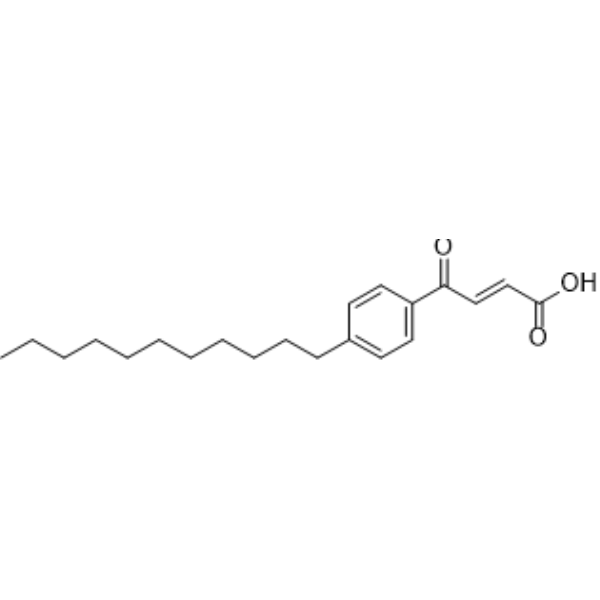
- HY-151172
-
|
|
MDM-2/p53
Apoptosis
|
Cancer
|
|
MDM2-p53-IN-15 is a MDM2-p53 inhibitor with an IC50 value of 26.1 nM. MDM2-p53-IN-15 inhibits the proliferation of various cancer cells and induces cell apoptosis. MDM2-p53-IN-15 can be used for the research of cancer .
|
-
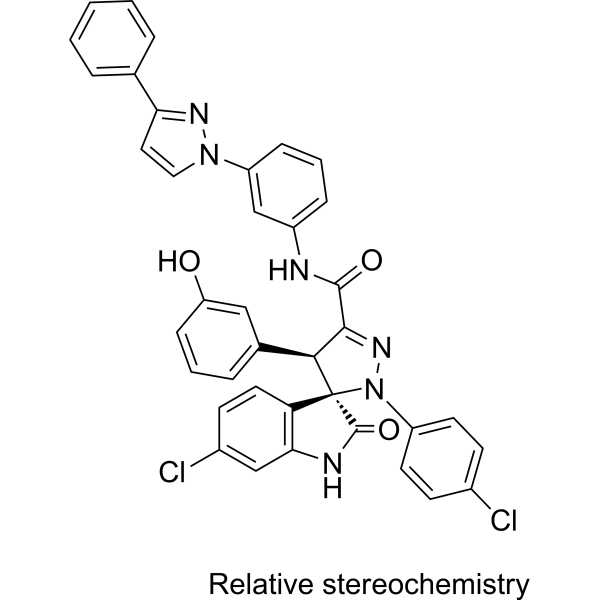
- HY-150500
-
|
|
HDAC
|
Cancer
|
|
HDAC-IN-44 is a HDAC inhibitor with the IC50 value of 61.2 nM. HDAC-IN-44 shows high anticancer activity towards multiple cancer cell lines .
|
-
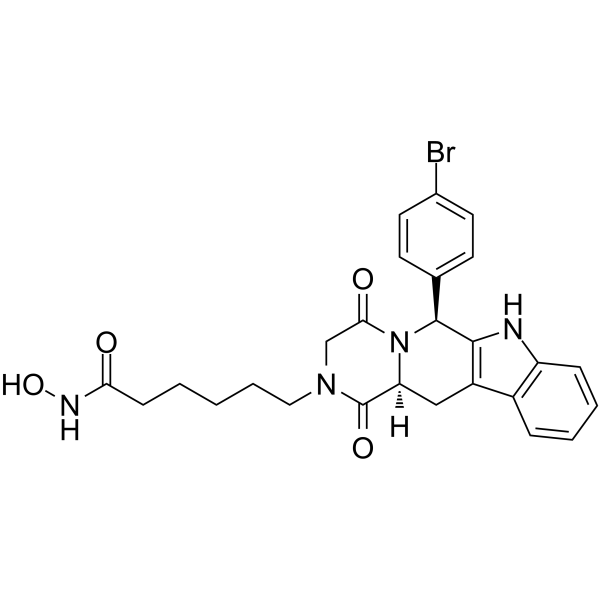
- HY-115747
-
|
|
Histone Demethylase
|
Cancer
|
|
Namoline, a γ-pyrone, is a selective and reversible Lysine-specific demethylase 1 (LSD1) inhibitor with an IC50 of 51 μM in a HRP-coupled enzymatic assay. Namoline impairs LSD1 demethylase activity and blocks cell proliferation. Namoline has the potential for androgen-dependent prostate cancer research .
|
-
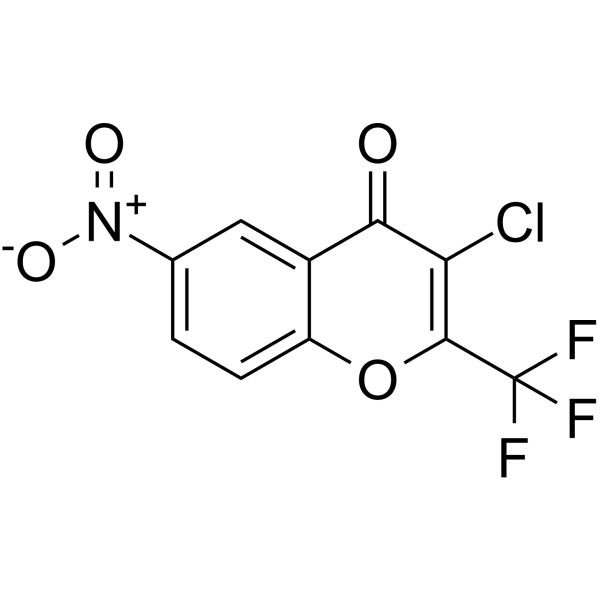
- HY-151266
-
|
|
Androgen Receptor
|
Cancer
|
|
AR antagonist 4 (Compound 67-b) is an orally active androgen receptor (AR) antagonist with an IC50 of 246.6 nM against wt-AR, and is also an AR degrader with a DC50 of 2.84 μM .
|
-
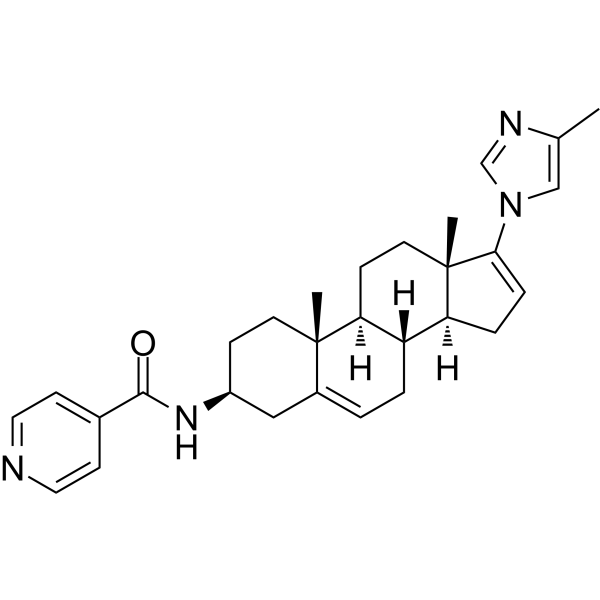
- HY-124056
-
|
|
CXCR
|
Cancer
|
|
AZ10397767 is an orally active, selective CXCR2 receptor antagonist with an IC50 of 1 nM. AZ10397767 attenuates the Oxaliplatin (HY-17371)-induced NF-κB transcriptional activity and potentiates Oxaliplatin-induced apoptosis in androgen-independent prostate cancer (AIPC) cells. AZ10397767 significantly inhibits neutrophil recruitment into tumors which then adversely affects tumor growth in vitro and in vivo .
|
-
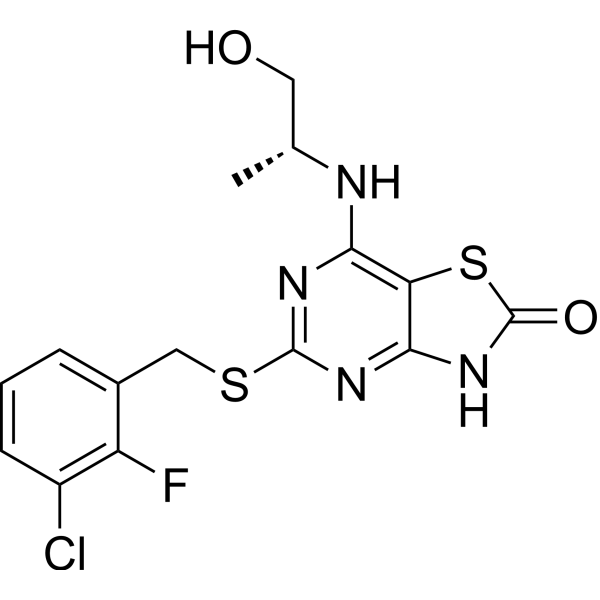
- HY-149091
-
|
|
Others
|
Cancer
|
|
KDM5B-IN-4 (compound 11ad) is a lysine demethylase 5B (KDM5B) inhibitor with an IC50 of 0.025 μM KDM5B-IN-4 increases substrate H3K4me1/2/3 level by inhibiting KDM5B in PC-3 cells. KDM5B-IN-4 downregulates PI3K/AKT. KDM5B-IN-4 reduces tumor volume in mice and shows less toxic to organs .
|
-
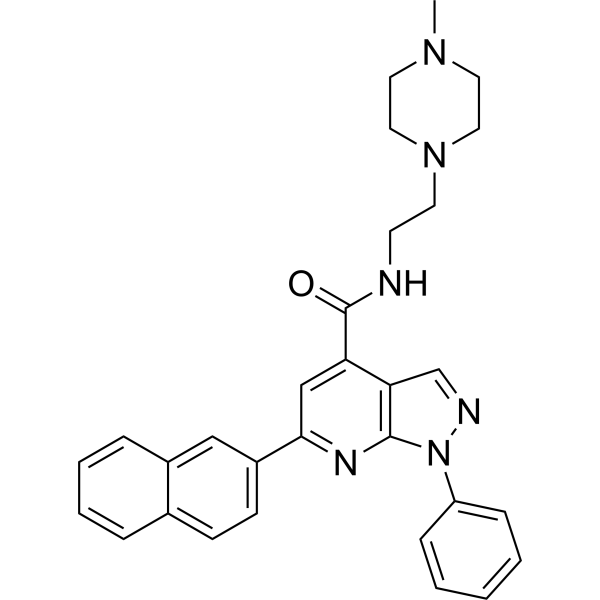
- HY-13915
-
|
|
Apoptosis
|
Cancer
|
|
NSC348884 is a nucleophosmin (NPM) inhibitor, it disrupts oligomer formation and induces apoptosis, inhibits cell proliferation with IC50s of 1.7-4.0 μM in distinct cancer cell lines. NSC348884 can be used for the research of cancer .
|
-
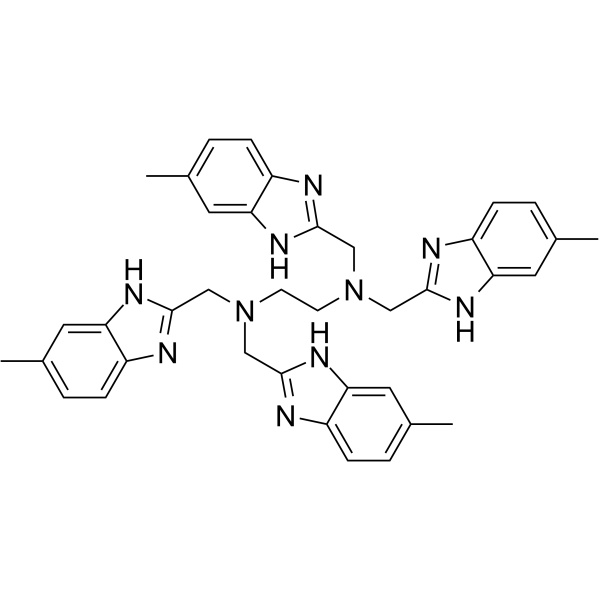
- HY-151576
-
|
|
Others
|
Cancer
|
|
PRMT5:MEP50 PPI is a novel PRMT5:MEP50 protein-protein interaction (PRMT5:MEP50 PPI) inhibitor, shows anti-tumor activity and anti-proliferative activity of lung and prostate cancer cells .
|
-
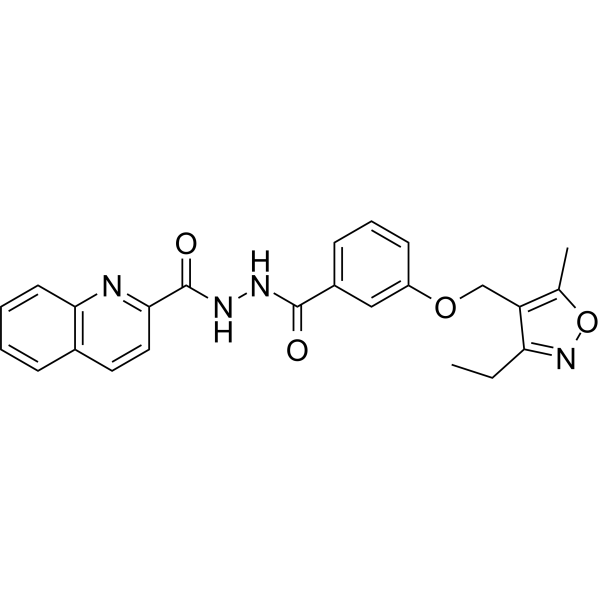
- HY-125727
-
|
|
Fungal
|
Infection
Cancer
|
|
Globosuxanthone A is a dihydroxanthenone with obvious antifungal activity towards Fusarium graminearum, Fusarium solani, and Botrytis cinerea with MIC values of 4, 8, and 16 μg/mL, respectively. Anticancer activity .
|
-
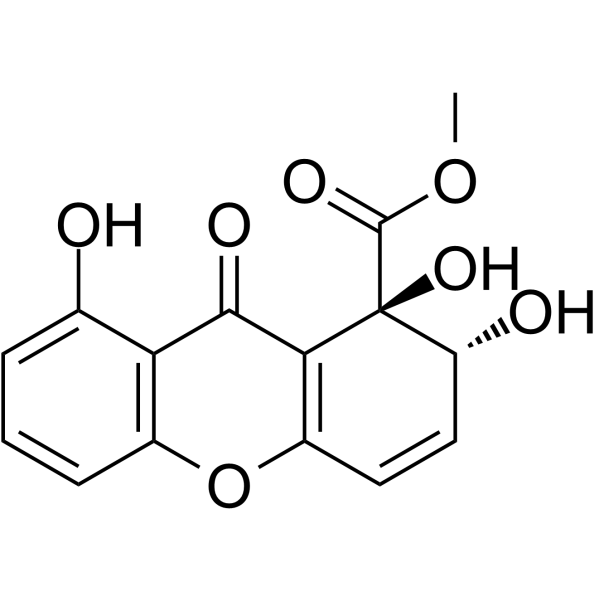
- HY-112083
-
|
|
AMPK
|
Cancer
|
|
BAY-3827 is a potent and selective AMPK inhibitor with IC50 values of 1.4 nM at low (10 µM ATP concentration) and 15 nM at high (2 mM ATP concentration). BAY-3827 shows over 500-fold selectivity for most of the 331 kinases. BAY-3827 prevents phosphorylation of acetyl-CoA carboxylase 1 and shows strongest anti-proliferative activity in androgen-dependent prostate cancer cell lines .
|
-
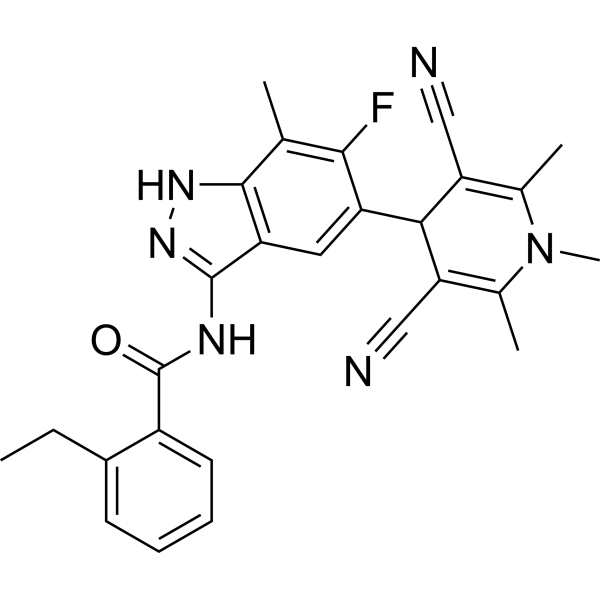
- HY-124628
-
|
|
Fatty Acid Synthase (FASN)
|
Cancer
|
|
IPI-9119 is an orally active, selective and irreversible FASN inhibitor with an IC50 of 0.3 nM in vitro biochemical assay. IPI-9119 inhibits tumor growth of castration-resistant prostate cancer (CRPC) xenografts mouse models .
|
-
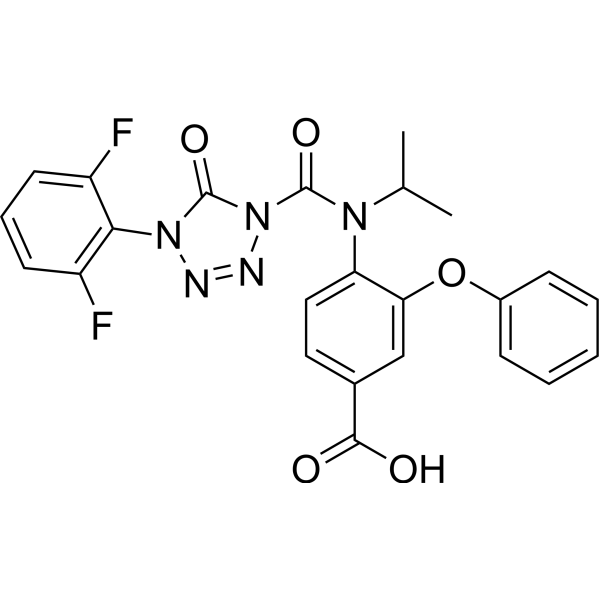
- HY-143332
-
|
|
Epigenetic Reader Domain
|
Cancer
|
|
TRIM24/BRPF1-IN-2 (compound 20l) is a potent TRIM24/BRPF1 dual inhibitor, with IC50 values of 0.98 and 1.16 μM, respectively. TRIM24/BRPF1-IN-2 shows TRIM24/BRPF1 bromodomain binding affinity. TRIM24/BRPF1-IN-2 can be used for prostate cancer research .
|
-
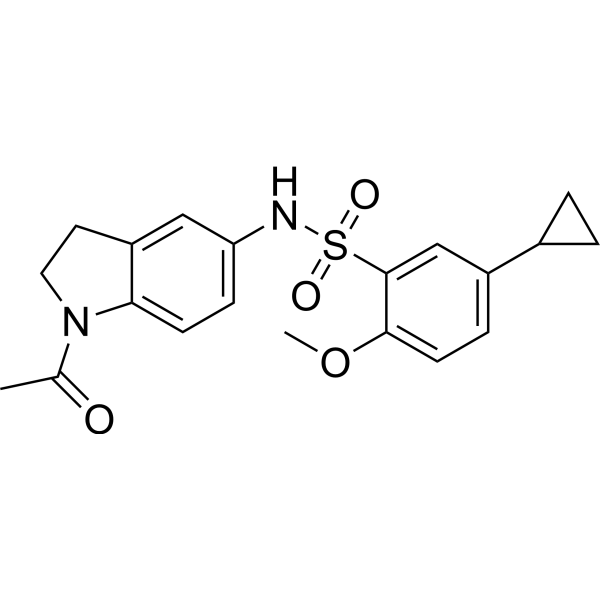
- HY-12325
-
|
|
Fatty Acid Synthase (FASN)
|
Cancer
|
|
GSK2194069 is a potent inhibitor of β-ketoyl reductase (KR) of fatty acid synthase (FASN), with an IC50 value of 7.7 nM. GSK2194069 shows specifically inhibitory effect on FAS expressing cancer cells, by acting potent efficacy on acetoacetyl-CoA, NADPH with IC50 or Ki values of 4.8 nM and 5.6 nM, respectively .
|
-
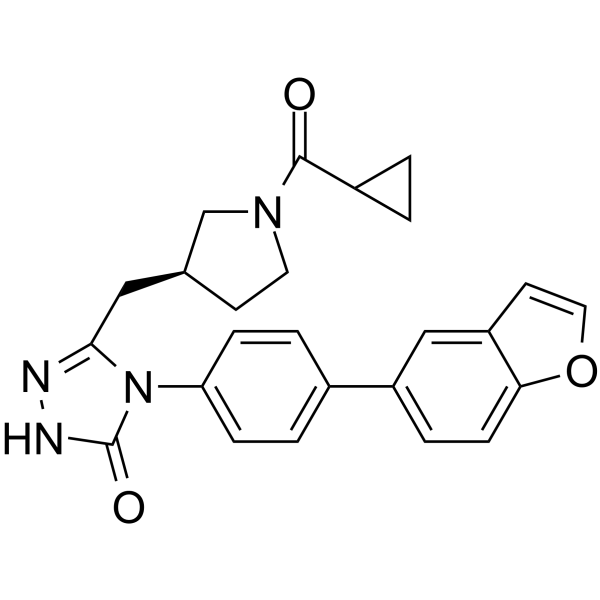
| Cat. No. |
Product Name |
Target |
Research Area |
-
- HY-P99274
-
|
BI 836845; Anti-Human IGF1 and IGF2 Recombinant Antibody
|
IGF-1R
|
Cancer
|
|
Xentuzumab (Anti-Human IGF1 and IGF2 Recombinant Antibody; BI836845) is a recombinant a human monoclonal antibody that targets IGF ligands IGF1 and IGF2. Xentuzumab inhibits both of IGF1 and IGF2 growth-promoting signalling and suppresses AKT activation .
|
-
- HY-P99183
-
|
EMD 525797; DI17E6
|
Integrin
|
Cancer
|
|
Abituzumab (DI17E6) is a humanised anti-integrin αV monoclonal antibody (IgG2 type). Abituzumab effectively reduces the phosphorylation of FAK, Akt and ERK. Abituzumab can be used in cancer research, particularly in prostate cancer .
|
| Cat. No. |
Product Name |
Category |
Target |
Chemical Structure |
| Cat. No. |
Product Name |
Chemical Structure |
-
- HY-70002S1
-
|
|
|
Enzalutamide-d6 is a deuterium labeled Enzalutamide (MDV3100). Enzalutamide is an androgen receptor (AR) antagonist with an IC50 of 36 nM in LNCaP prostate cells[1].
|
-

-
- HY-13626S
-
|
|
|
Spisulosine-d3 is deuterium labeled Spisulosine. Spisulosine (ES-285) is an antiproliferative (antitumoral) compound of marine origin. Spisulosine inhibits the growth of the prostate PC-3 and LNCaP cells through intracellular ceramide accumulation and PKC
|
-

-
- HY-109015S
-
|
|
|
Tucidinostat-d4 is the deuterium labeled Tucidinostat. Tucidinostat is a potent and orally bioavailable HDAC enzymes class I (HDAC1/2/3) and class IIb (HDAC10) inhibitor, with IC50s of 95, 160, 67 and 78 nM, respectively[1].
|
-

Your information is safe with us. * Required Fields.
Inquiry Information
- Product Name:
- Cat. No.:
- Quantity:
- MCE Japan Authorized Agent:









































































































